MG629 Developing Leadership and Management Skills CW 2
VerifiedAdded on 2023/06/04
|22
|4542
|402
AI Summary
This report evaluates the importance of management and leadership theories in achieving organizational goals. It includes an action plan to evaluate weaknesses and solutions to overcome them. The report also covers leadership and management theories, and the development of leadership and management skills.
Contribute Materials
Your contribution can guide someone’s learning journey. Share your
documents today.
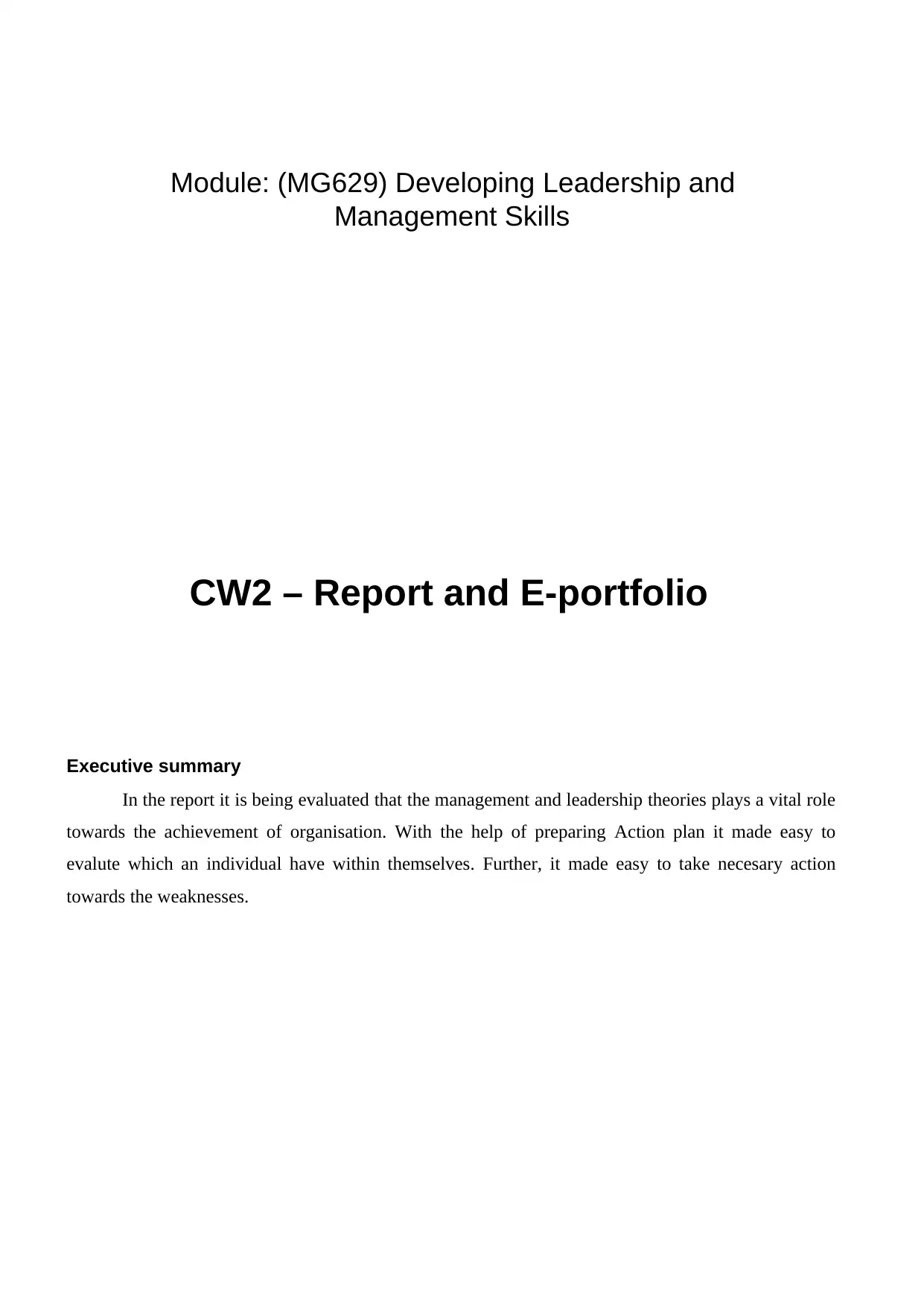
Module: (MG629) Developing Leadership and
Management Skills
CW2 – Report and E-portfolio
Executive summary
In the report it is being evaluated that the management and leadership theories plays a vital role
towards the achievement of organisation. With the help of preparing Action plan it made easy to
evalute which an individual have within themselves. Further, it made easy to take necesary action
towards the weaknesses.
Management Skills
CW2 – Report and E-portfolio
Executive summary
In the report it is being evaluated that the management and leadership theories plays a vital role
towards the achievement of organisation. With the help of preparing Action plan it made easy to
evalute which an individual have within themselves. Further, it made easy to take necesary action
towards the weaknesses.
Secure Best Marks with AI Grader
Need help grading? Try our AI Grader for instant feedback on your assignments.
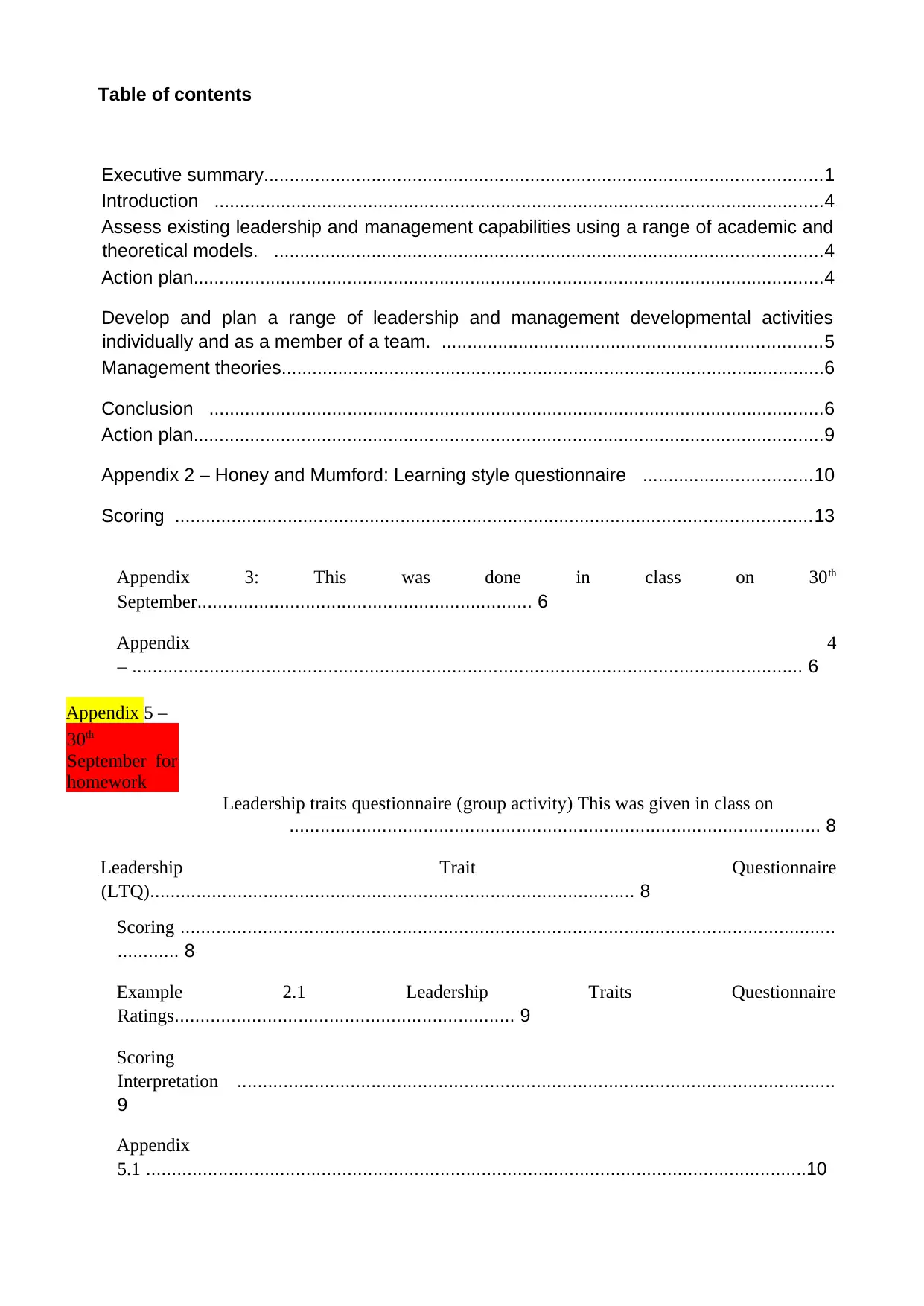
Table of contents
Executive summary.............................................................................................................1
Introduction .......................................................................................................................4
Assess existing leadership and management capabilities using a range of academic and
theoretical models. ...........................................................................................................4
Action plan...........................................................................................................................4
Develop and plan a range of leadership and management developmental activities
individually and as a member of a team. ..........................................................................5
Management theories..........................................................................................................6
Conclusion ........................................................................................................................6
Action plan...........................................................................................................................9
Appendix 2 – Honey and Mumford: Learning style questionnaire .................................10
Scoring ............................................................................................................................13
Appendix 3: This was done in class on 30th
September................................................................. 6
Appendix 4
– .................................................................................................................................. 6
Appendix 5 –
30th
September for
homework
Leadership traits questionnaire (group activity) This was given in class on
....................................................................................................... 8
Leadership Trait Questionnaire
(LTQ).............................................................................................. 8
Scoring ...............................................................................................................................
............ 8
Example 2.1 Leadership Traits Questionnaire
Ratings.................................................................. 9
Scoring
Interpretation ....................................................................................................................
9
Appendix
5.1 ................................................................................................................................10
Executive summary.............................................................................................................1
Introduction .......................................................................................................................4
Assess existing leadership and management capabilities using a range of academic and
theoretical models. ...........................................................................................................4
Action plan...........................................................................................................................4
Develop and plan a range of leadership and management developmental activities
individually and as a member of a team. ..........................................................................5
Management theories..........................................................................................................6
Conclusion ........................................................................................................................6
Action plan...........................................................................................................................9
Appendix 2 – Honey and Mumford: Learning style questionnaire .................................10
Scoring ............................................................................................................................13
Appendix 3: This was done in class on 30th
September................................................................. 6
Appendix 4
– .................................................................................................................................. 6
Appendix 5 –
30th
September for
homework
Leadership traits questionnaire (group activity) This was given in class on
....................................................................................................... 8
Leadership Trait Questionnaire
(LTQ).............................................................................................. 8
Scoring ...............................................................................................................................
............ 8
Example 2.1 Leadership Traits Questionnaire
Ratings.................................................................. 9
Scoring
Interpretation ....................................................................................................................
9
Appendix
5.1 ................................................................................................................................10

Appendix Special: PDP Smart goal based on your above
appendices:......................................11
Skills Development Action
Plan .....................................................................................................11 E-portfolio of
personal development activities, evidence and self-reflection
appendices:......................................11
Skills Development Action
Plan .....................................................................................................11 E-portfolio of
personal development activities, evidence and self-reflection
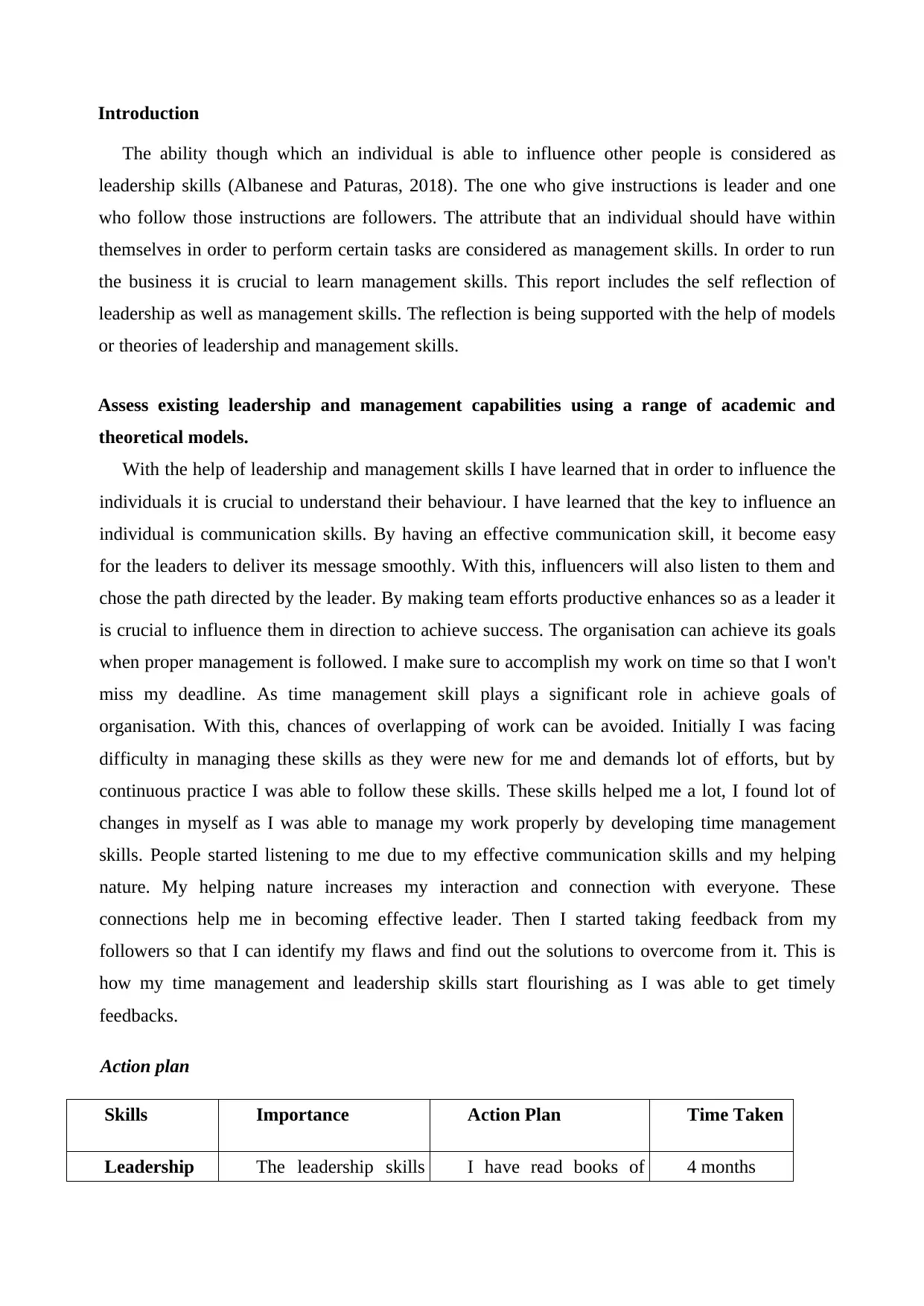
Introduction
The ability though which an individual is able to influence other people is considered as
leadership skills (Albanese and Paturas, 2018). The one who give instructions is leader and one
who follow those instructions are followers. The attribute that an individual should have within
themselves in order to perform certain tasks are considered as management skills. In order to run
the business it is crucial to learn management skills. This report includes the self reflection of
leadership as well as management skills. The reflection is being supported with the help of models
or theories of leadership and management skills.
Assess existing leadership and management capabilities using a range of academic and
theoretical models.
With the help of leadership and management skills I have learned that in order to influence the
individuals it is crucial to understand their behaviour. I have learned that the key to influence an
individual is communication skills. By having an effective communication skill, it become easy
for the leaders to deliver its message smoothly. With this, influencers will also listen to them and
chose the path directed by the leader. By making team efforts productive enhances so as a leader it
is crucial to influence them in direction to achieve success. The organisation can achieve its goals
when proper management is followed. I make sure to accomplish my work on time so that I won't
miss my deadline. As time management skill plays a significant role in achieve goals of
organisation. With this, chances of overlapping of work can be avoided. Initially I was facing
difficulty in managing these skills as they were new for me and demands lot of efforts, but by
continuous practice I was able to follow these skills. These skills helped me a lot, I found lot of
changes in myself as I was able to manage my work properly by developing time management
skills. People started listening to me due to my effective communication skills and my helping
nature. My helping nature increases my interaction and connection with everyone. These
connections help me in becoming effective leader. Then I started taking feedback from my
followers so that I can identify my flaws and find out the solutions to overcome from it. This is
how my time management and leadership skills start flourishing as I was able to get timely
feedbacks.
Action plan
Skills Importance Action Plan Time Taken
Leadership The leadership skills I have read books of 4 months
The ability though which an individual is able to influence other people is considered as
leadership skills (Albanese and Paturas, 2018). The one who give instructions is leader and one
who follow those instructions are followers. The attribute that an individual should have within
themselves in order to perform certain tasks are considered as management skills. In order to run
the business it is crucial to learn management skills. This report includes the self reflection of
leadership as well as management skills. The reflection is being supported with the help of models
or theories of leadership and management skills.
Assess existing leadership and management capabilities using a range of academic and
theoretical models.
With the help of leadership and management skills I have learned that in order to influence the
individuals it is crucial to understand their behaviour. I have learned that the key to influence an
individual is communication skills. By having an effective communication skill, it become easy
for the leaders to deliver its message smoothly. With this, influencers will also listen to them and
chose the path directed by the leader. By making team efforts productive enhances so as a leader it
is crucial to influence them in direction to achieve success. The organisation can achieve its goals
when proper management is followed. I make sure to accomplish my work on time so that I won't
miss my deadline. As time management skill plays a significant role in achieve goals of
organisation. With this, chances of overlapping of work can be avoided. Initially I was facing
difficulty in managing these skills as they were new for me and demands lot of efforts, but by
continuous practice I was able to follow these skills. These skills helped me a lot, I found lot of
changes in myself as I was able to manage my work properly by developing time management
skills. People started listening to me due to my effective communication skills and my helping
nature. My helping nature increases my interaction and connection with everyone. These
connections help me in becoming effective leader. Then I started taking feedback from my
followers so that I can identify my flaws and find out the solutions to overcome from it. This is
how my time management and leadership skills start flourishing as I was able to get timely
feedbacks.
Action plan
Skills Importance Action Plan Time Taken
Leadership The leadership skills I have read books of 4 months
Secure Best Marks with AI Grader
Need help grading? Try our AI Grader for instant feedback on your assignments.
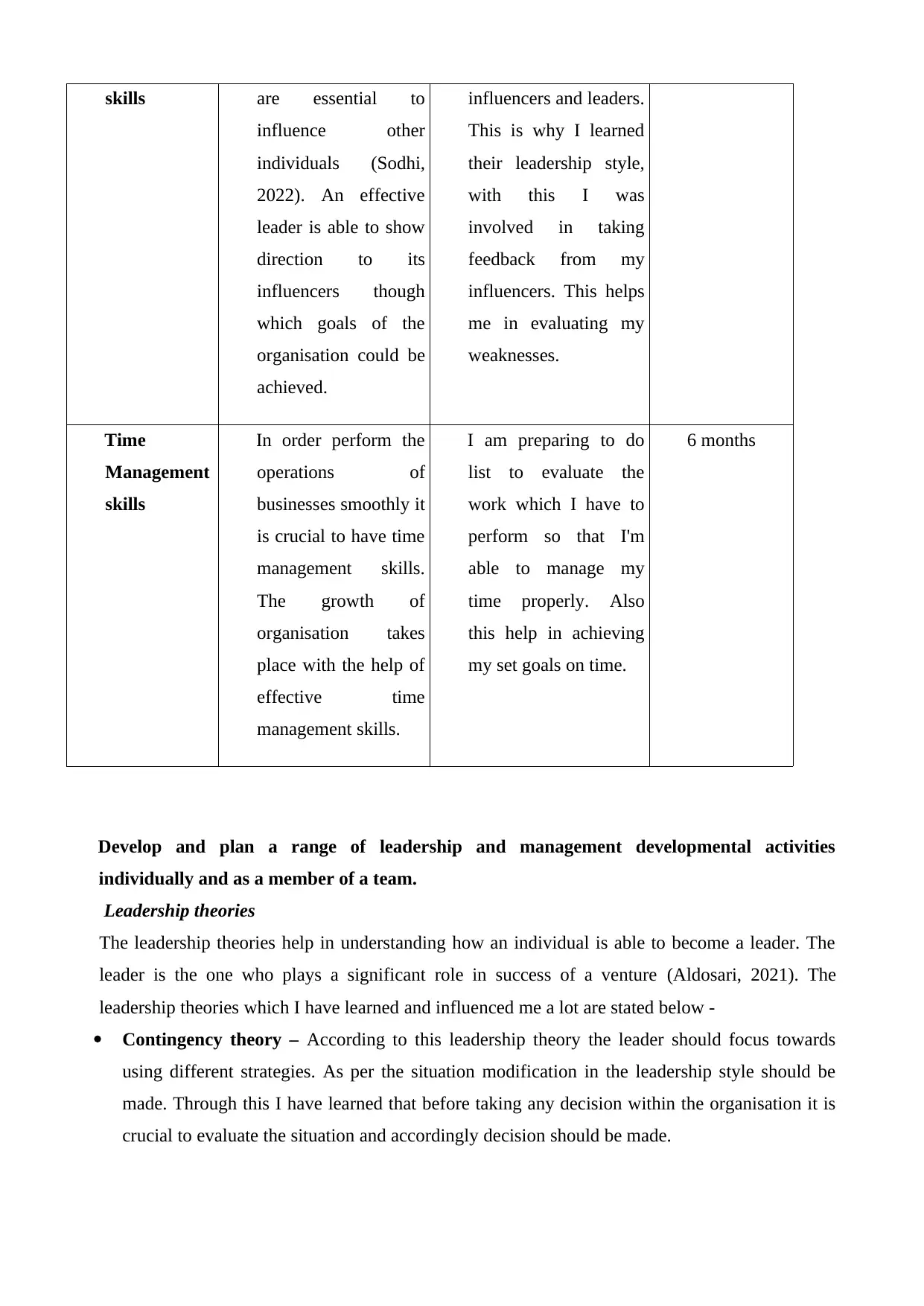
skills are essential to
influence other
individuals (Sodhi,
2022). An effective
leader is able to show
direction to its
influencers though
which goals of the
organisation could be
achieved.
influencers and leaders.
This is why I learned
their leadership style,
with this I was
involved in taking
feedback from my
influencers. This helps
me in evaluating my
weaknesses.
Time
Management
skills
In order perform the
operations of
businesses smoothly it
is crucial to have time
management skills.
The growth of
organisation takes
place with the help of
effective time
management skills.
I am preparing to do
list to evaluate the
work which I have to
perform so that I'm
able to manage my
time properly. Also
this help in achieving
my set goals on time.
6 months
Develop and plan a range of leadership and management developmental activities
individually and as a member of a team.
Leadership theories
The leadership theories help in understanding how an individual is able to become a leader. The
leader is the one who plays a significant role in success of a venture (Aldosari, 2021). The
leadership theories which I have learned and influenced me a lot are stated below -
Contingency theory – According to this leadership theory the leader should focus towards
using different strategies. As per the situation modification in the leadership style should be
made. Through this I have learned that before taking any decision within the organisation it is
crucial to evaluate the situation and accordingly decision should be made.
influence other
individuals (Sodhi,
2022). An effective
leader is able to show
direction to its
influencers though
which goals of the
organisation could be
achieved.
influencers and leaders.
This is why I learned
their leadership style,
with this I was
involved in taking
feedback from my
influencers. This helps
me in evaluating my
weaknesses.
Time
Management
skills
In order perform the
operations of
businesses smoothly it
is crucial to have time
management skills.
The growth of
organisation takes
place with the help of
effective time
management skills.
I am preparing to do
list to evaluate the
work which I have to
perform so that I'm
able to manage my
time properly. Also
this help in achieving
my set goals on time.
6 months
Develop and plan a range of leadership and management developmental activities
individually and as a member of a team.
Leadership theories
The leadership theories help in understanding how an individual is able to become a leader. The
leader is the one who plays a significant role in success of a venture (Aldosari, 2021). The
leadership theories which I have learned and influenced me a lot are stated below -
Contingency theory – According to this leadership theory the leader should focus towards
using different strategies. As per the situation modification in the leadership style should be
made. Through this I have learned that before taking any decision within the organisation it is
crucial to evaluate the situation and accordingly decision should be made.
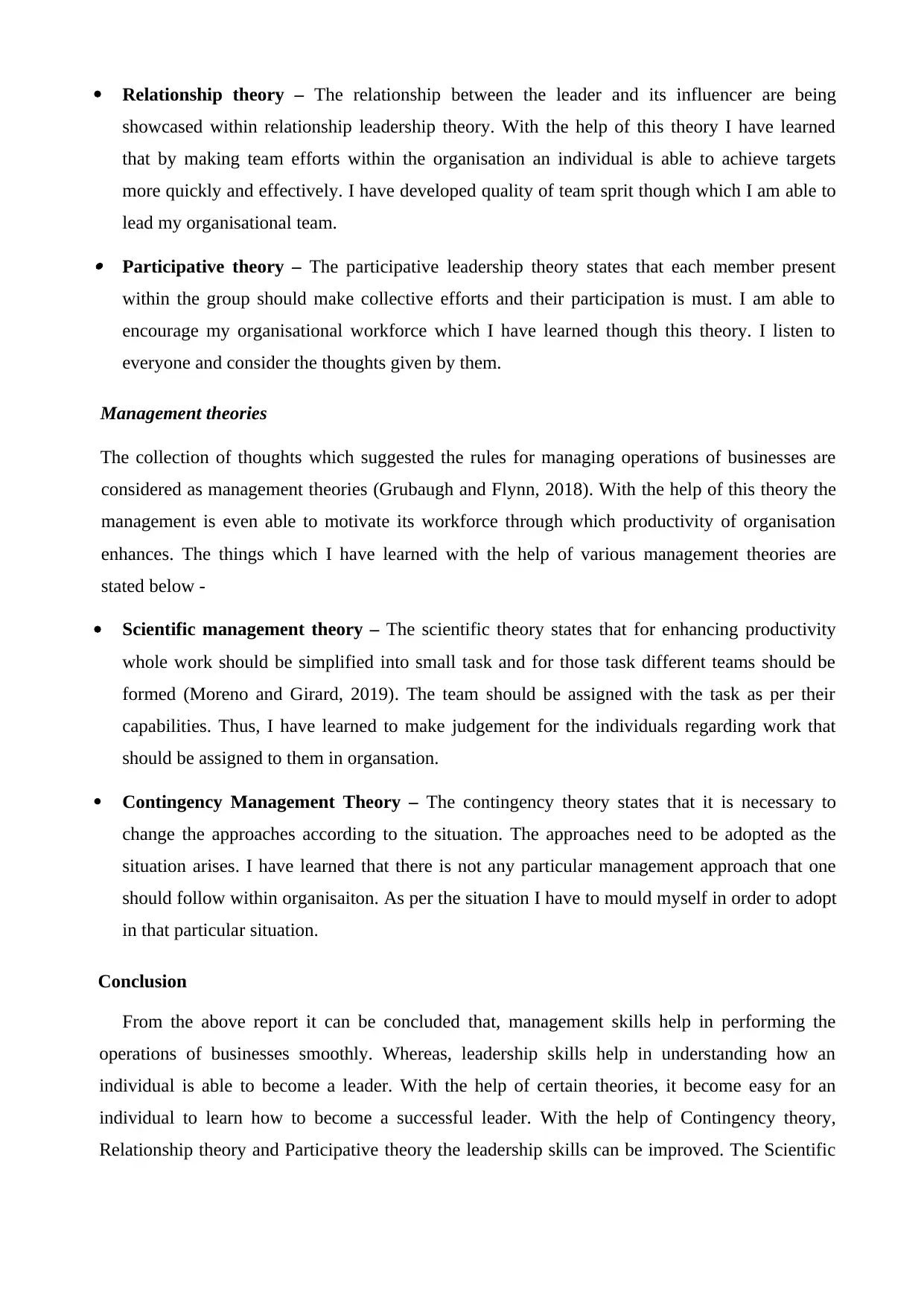
Relationship theory – The relationship between the leader and its influencer are being
showcased within relationship leadership theory. With the help of this theory I have learned
that by making team efforts within the organisation an individual is able to achieve targets
more quickly and effectively. I have developed quality of team sprit though which I am able to
lead my organisational team.
Participative theory – The participative leadership theory states that each member present
within the group should make collective efforts and their participation is must. I am able to
encourage my organisational workforce which I have learned though this theory. I listen to
everyone and consider the thoughts given by them.
Management theories
The collection of thoughts which suggested the rules for managing operations of businesses are
considered as management theories (Grubaugh and Flynn, 2018). With the help of this theory the
management is even able to motivate its workforce through which productivity of organisation
enhances. The things which I have learned with the help of various management theories are
stated below -
Scientific management theory – The scientific theory states that for enhancing productivity
whole work should be simplified into small task and for those task different teams should be
formed (Moreno and Girard, 2019). The team should be assigned with the task as per their
capabilities. Thus, I have learned to make judgement for the individuals regarding work that
should be assigned to them in organsation.
Contingency Management Theory – The contingency theory states that it is necessary to
change the approaches according to the situation. The approaches need to be adopted as the
situation arises. I have learned that there is not any particular management approach that one
should follow within organisaiton. As per the situation I have to mould myself in order to adopt
in that particular situation.
Conclusion
From the above report it can be concluded that, management skills help in performing the
operations of businesses smoothly. Whereas, leadership skills help in understanding how an
individual is able to become a leader. With the help of certain theories, it become easy for an
individual to learn how to become a successful leader. With the help of Contingency theory,
Relationship theory and Participative theory the leadership skills can be improved. The Scientific
showcased within relationship leadership theory. With the help of this theory I have learned
that by making team efforts within the organisation an individual is able to achieve targets
more quickly and effectively. I have developed quality of team sprit though which I am able to
lead my organisational team.
Participative theory – The participative leadership theory states that each member present
within the group should make collective efforts and their participation is must. I am able to
encourage my organisational workforce which I have learned though this theory. I listen to
everyone and consider the thoughts given by them.
Management theories
The collection of thoughts which suggested the rules for managing operations of businesses are
considered as management theories (Grubaugh and Flynn, 2018). With the help of this theory the
management is even able to motivate its workforce through which productivity of organisation
enhances. The things which I have learned with the help of various management theories are
stated below -
Scientific management theory – The scientific theory states that for enhancing productivity
whole work should be simplified into small task and for those task different teams should be
formed (Moreno and Girard, 2019). The team should be assigned with the task as per their
capabilities. Thus, I have learned to make judgement for the individuals regarding work that
should be assigned to them in organsation.
Contingency Management Theory – The contingency theory states that it is necessary to
change the approaches according to the situation. The approaches need to be adopted as the
situation arises. I have learned that there is not any particular management approach that one
should follow within organisaiton. As per the situation I have to mould myself in order to adopt
in that particular situation.
Conclusion
From the above report it can be concluded that, management skills help in performing the
operations of businesses smoothly. Whereas, leadership skills help in understanding how an
individual is able to become a leader. With the help of certain theories, it become easy for an
individual to learn how to become a successful leader. With the help of Contingency theory,
Relationship theory and Participative theory the leadership skills can be improved. The Scientific

management theory and Contingency Management Theory helps in improving management skills.
By making action plan it become easy for an individual to evaluate weakness and its solutions to
overcome from it.
By making action plan it become easy for an individual to evaluate weakness and its solutions to
overcome from it.
Paraphrase This Document
Need a fresh take? Get an instant paraphrase of this document with our AI Paraphraser
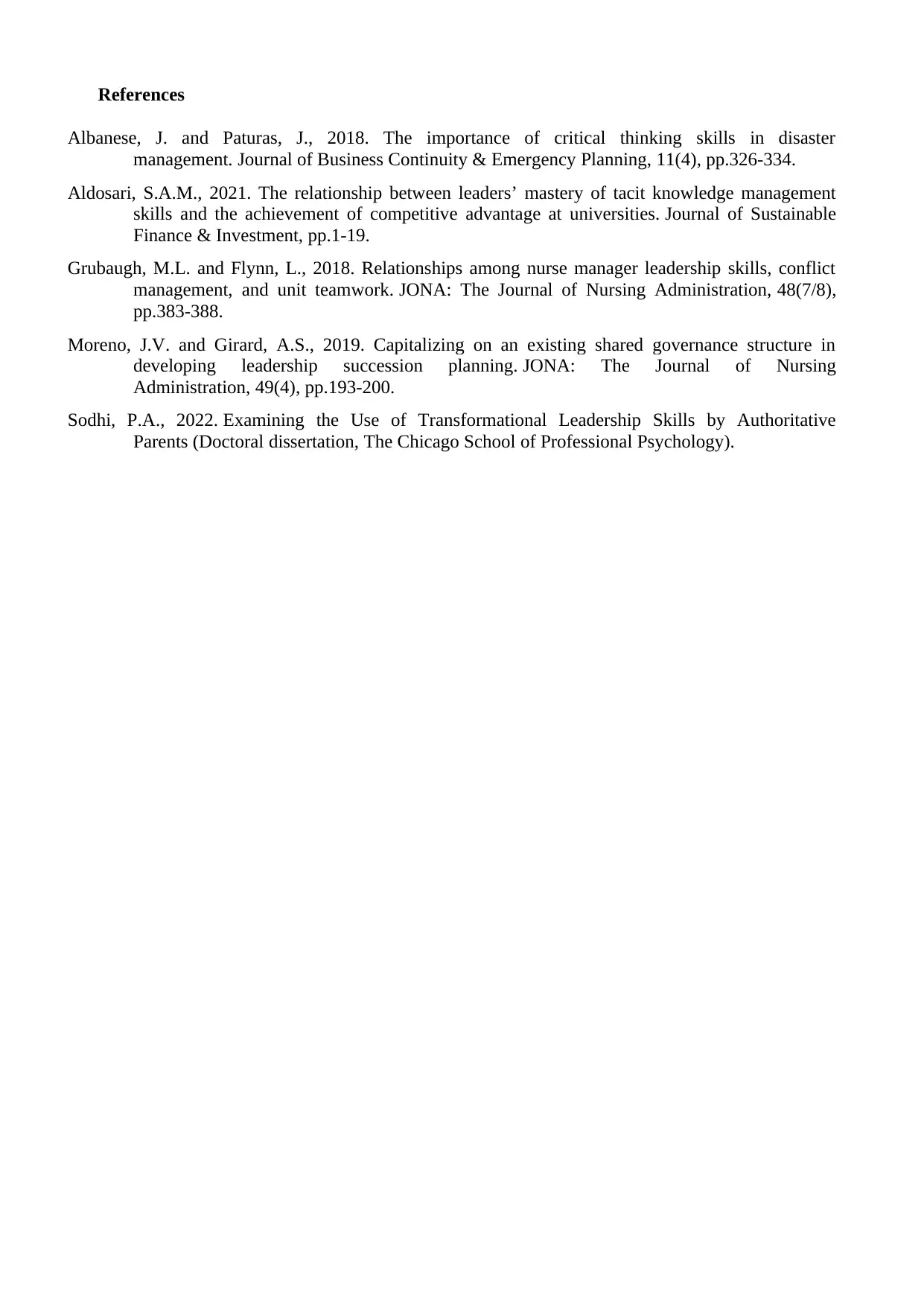
References
Albanese, J. and Paturas, J., 2018. The importance of critical thinking skills in disaster
management. Journal of Business Continuity & Emergency Planning, 11(4), pp.326-334.
Aldosari, S.A.M., 2021. The relationship between leaders’ mastery of tacit knowledge management
skills and the achievement of competitive advantage at universities. Journal of Sustainable
Finance & Investment, pp.1-19.
Grubaugh, M.L. and Flynn, L., 2018. Relationships among nurse manager leadership skills, conflict
management, and unit teamwork. JONA: The Journal of Nursing Administration, 48(7/8),
pp.383-388.
Moreno, J.V. and Girard, A.S., 2019. Capitalizing on an existing shared governance structure in
developing leadership succession planning. JONA: The Journal of Nursing
Administration, 49(4), pp.193-200.
Sodhi, P.A., 2022. Examining the Use of Transformational Leadership Skills by Authoritative
Parents (Doctoral dissertation, The Chicago School of Professional Psychology).
Albanese, J. and Paturas, J., 2018. The importance of critical thinking skills in disaster
management. Journal of Business Continuity & Emergency Planning, 11(4), pp.326-334.
Aldosari, S.A.M., 2021. The relationship between leaders’ mastery of tacit knowledge management
skills and the achievement of competitive advantage at universities. Journal of Sustainable
Finance & Investment, pp.1-19.
Grubaugh, M.L. and Flynn, L., 2018. Relationships among nurse manager leadership skills, conflict
management, and unit teamwork. JONA: The Journal of Nursing Administration, 48(7/8),
pp.383-388.
Moreno, J.V. and Girard, A.S., 2019. Capitalizing on an existing shared governance structure in
developing leadership succession planning. JONA: The Journal of Nursing
Administration, 49(4), pp.193-200.
Sodhi, P.A., 2022. Examining the Use of Transformational Leadership Skills by Authoritative
Parents (Doctoral dissertation, The Chicago School of Professional Psychology).
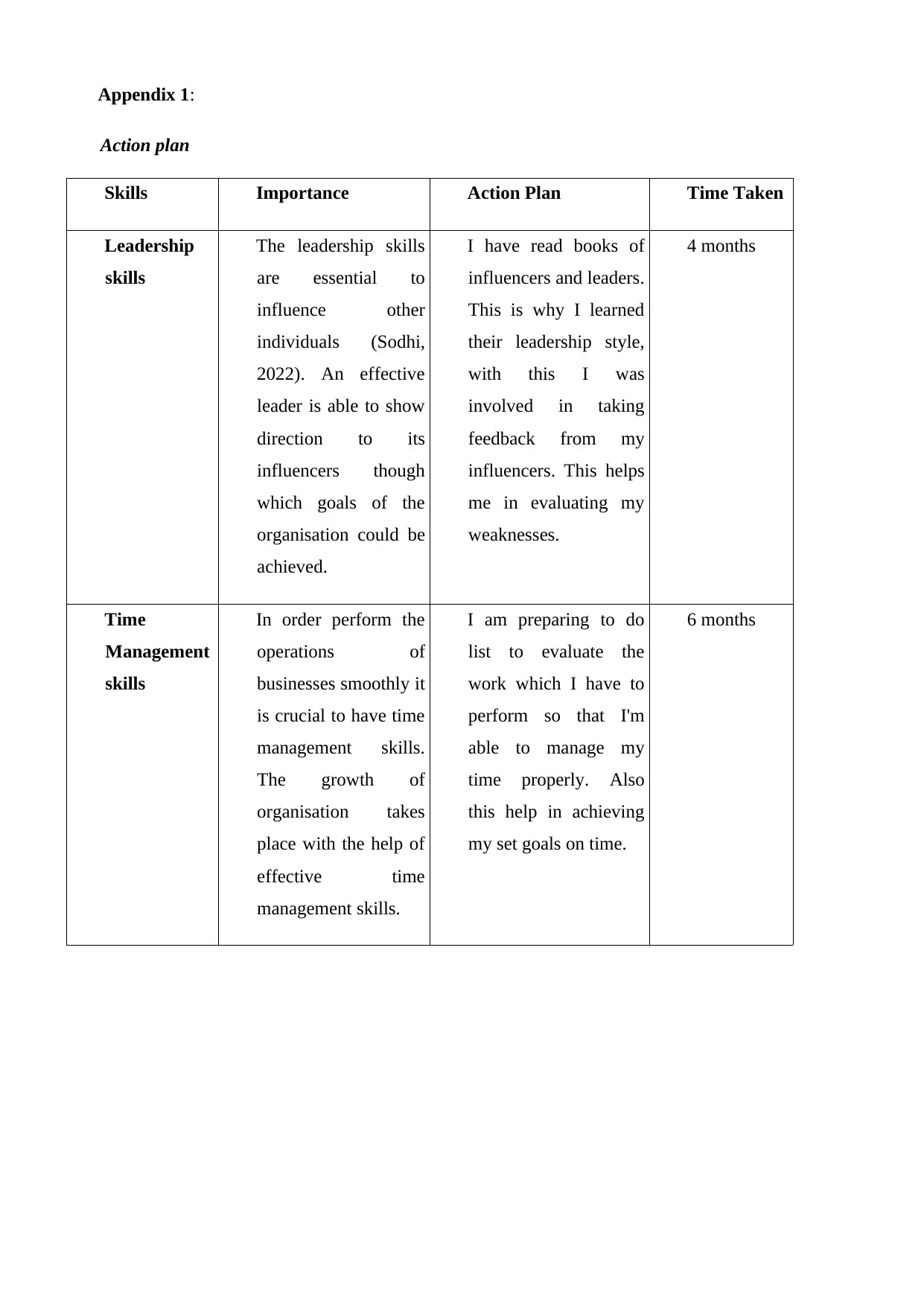
Appendix 1:
Action plan
Skills Importance Action Plan Time Taken
Leadership
skills
The leadership skills
are essential to
influence other
individuals (Sodhi,
2022). An effective
leader is able to show
direction to its
influencers though
which goals of the
organisation could be
achieved.
I have read books of
influencers and leaders.
This is why I learned
their leadership style,
with this I was
involved in taking
feedback from my
influencers. This helps
me in evaluating my
weaknesses.
4 months
Time
Management
skills
In order perform the
operations of
businesses smoothly it
is crucial to have time
management skills.
The growth of
organisation takes
place with the help of
effective time
management skills.
I am preparing to do
list to evaluate the
work which I have to
perform so that I'm
able to manage my
time properly. Also
this help in achieving
my set goals on time.
6 months
Action plan
Skills Importance Action Plan Time Taken
Leadership
skills
The leadership skills
are essential to
influence other
individuals (Sodhi,
2022). An effective
leader is able to show
direction to its
influencers though
which goals of the
organisation could be
achieved.
I have read books of
influencers and leaders.
This is why I learned
their leadership style,
with this I was
involved in taking
feedback from my
influencers. This helps
me in evaluating my
weaknesses.
4 months
Time
Management
skills
In order perform the
operations of
businesses smoothly it
is crucial to have time
management skills.
The growth of
organisation takes
place with the help of
effective time
management skills.
I am preparing to do
list to evaluate the
work which I have to
perform so that I'm
able to manage my
time properly. Also
this help in achieving
my set goals on time.
6 months
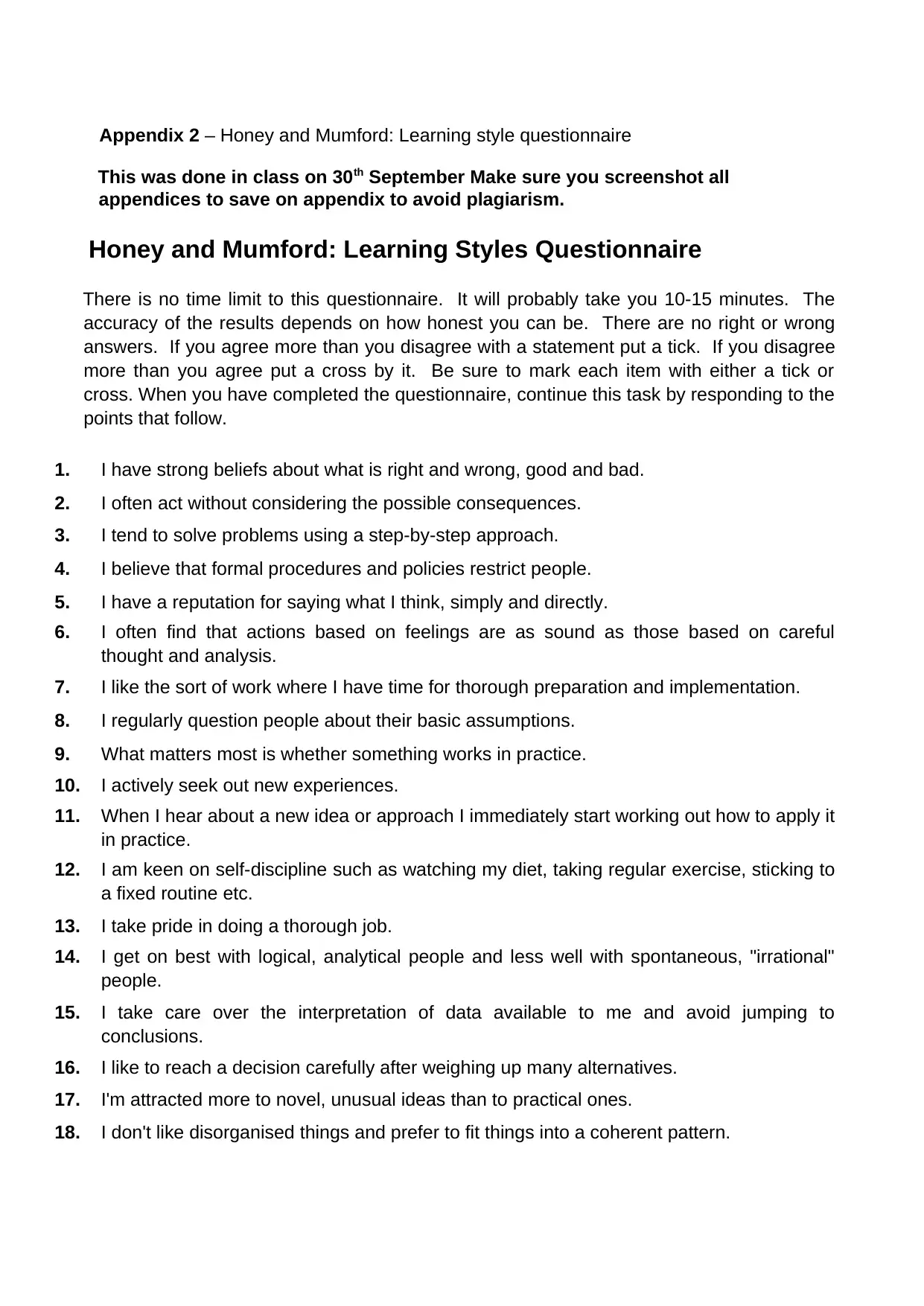
Appendix 2 – Honey and Mumford: Learning style questionnaire
This was done in class on 30th September Make sure you screenshot all
appendices to save on appendix to avoid plagiarism.
Honey and Mumford: Learning Styles Questionnaire
There is no time limit to this questionnaire. It will probably take you 10-15 minutes. The
accuracy of the results depends on how honest you can be. There are no right or wrong
answers. If you agree more than you disagree with a statement put a tick. If you disagree
more than you agree put a cross by it. Be sure to mark each item with either a tick or
cross. When you have completed the questionnaire, continue this task by responding to the
points that follow.
1. I have strong beliefs about what is right and wrong, good and bad.
2. I often act without considering the possible consequences.
3. I tend to solve problems using a step-by-step approach.
4. I believe that formal procedures and policies restrict people.
5. I have a reputation for saying what I think, simply and directly.
6. I often find that actions based on feelings are as sound as those based on careful
thought and analysis.
7. I like the sort of work where I have time for thorough preparation and implementation.
8. I regularly question people about their basic assumptions.
9. What matters most is whether something works in practice.
10. I actively seek out new experiences.
11. When I hear about a new idea or approach I immediately start working out how to apply it
in practice.
12. I am keen on self-discipline such as watching my diet, taking regular exercise, sticking to
a fixed routine etc.
13. I take pride in doing a thorough job.
14. I get on best with logical, analytical people and less well with spontaneous, "irrational"
people.
15. I take care over the interpretation of data available to me and avoid jumping to
conclusions.
16. I like to reach a decision carefully after weighing up many alternatives.
17. I'm attracted more to novel, unusual ideas than to practical ones.
18. I don't like disorganised things and prefer to fit things into a coherent pattern.
This was done in class on 30th September Make sure you screenshot all
appendices to save on appendix to avoid plagiarism.
Honey and Mumford: Learning Styles Questionnaire
There is no time limit to this questionnaire. It will probably take you 10-15 minutes. The
accuracy of the results depends on how honest you can be. There are no right or wrong
answers. If you agree more than you disagree with a statement put a tick. If you disagree
more than you agree put a cross by it. Be sure to mark each item with either a tick or
cross. When you have completed the questionnaire, continue this task by responding to the
points that follow.
1. I have strong beliefs about what is right and wrong, good and bad.
2. I often act without considering the possible consequences.
3. I tend to solve problems using a step-by-step approach.
4. I believe that formal procedures and policies restrict people.
5. I have a reputation for saying what I think, simply and directly.
6. I often find that actions based on feelings are as sound as those based on careful
thought and analysis.
7. I like the sort of work where I have time for thorough preparation and implementation.
8. I regularly question people about their basic assumptions.
9. What matters most is whether something works in practice.
10. I actively seek out new experiences.
11. When I hear about a new idea or approach I immediately start working out how to apply it
in practice.
12. I am keen on self-discipline such as watching my diet, taking regular exercise, sticking to
a fixed routine etc.
13. I take pride in doing a thorough job.
14. I get on best with logical, analytical people and less well with spontaneous, "irrational"
people.
15. I take care over the interpretation of data available to me and avoid jumping to
conclusions.
16. I like to reach a decision carefully after weighing up many alternatives.
17. I'm attracted more to novel, unusual ideas than to practical ones.
18. I don't like disorganised things and prefer to fit things into a coherent pattern.
Secure Best Marks with AI Grader
Need help grading? Try our AI Grader for instant feedback on your assignments.
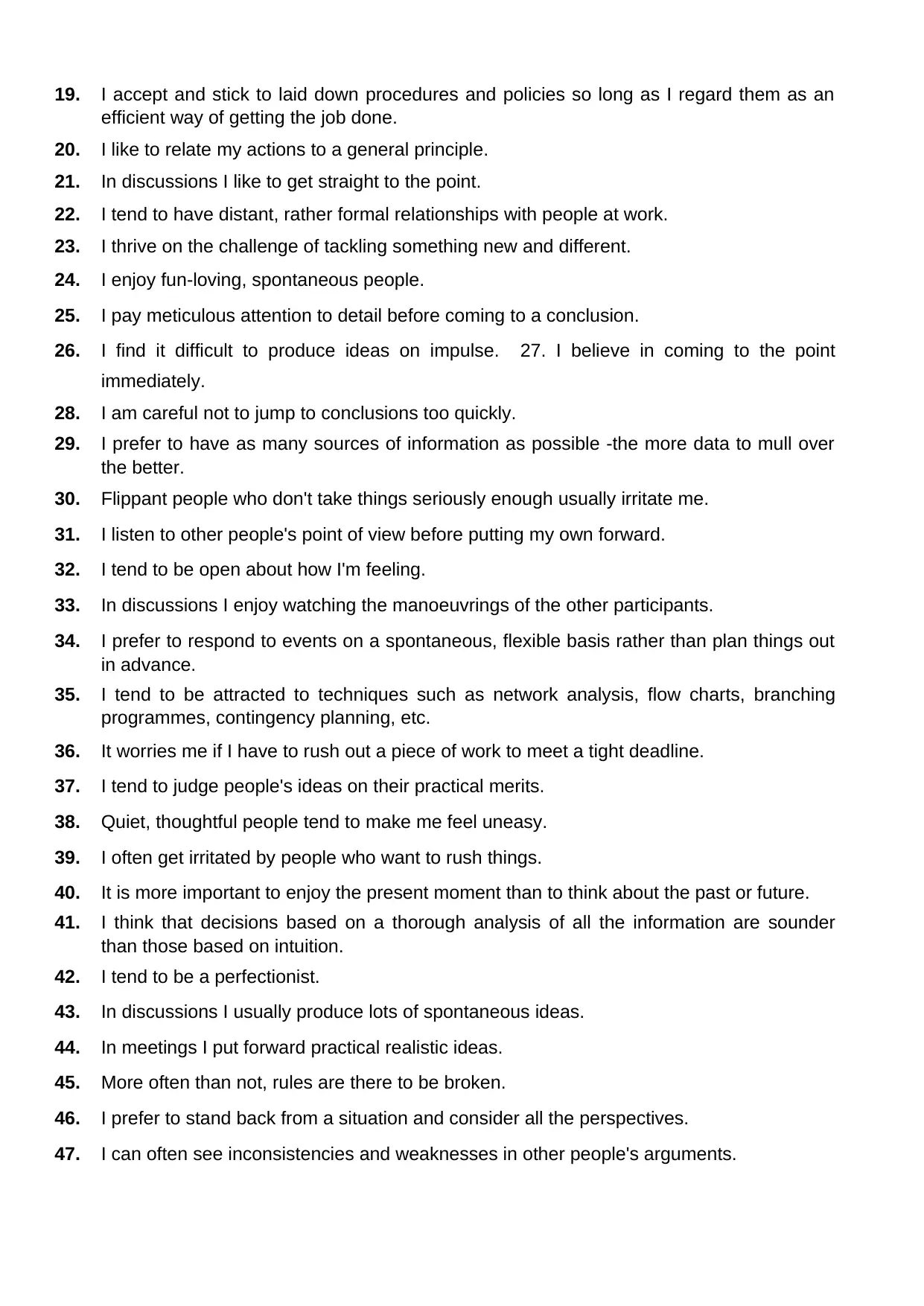
19. I accept and stick to laid down procedures and policies so long as I regard them as an
efficient way of getting the job done.
20. I like to relate my actions to a general principle.
21. In discussions I like to get straight to the point.
22. I tend to have distant, rather formal relationships with people at work.
23. I thrive on the challenge of tackling something new and different.
24. I enjoy fun-loving, spontaneous people.
25. I pay meticulous attention to detail before coming to a conclusion.
26. I find it difficult to produce ideas on impulse. 27. I believe in coming to the point
immediately.
28. I am careful not to jump to conclusions too quickly.
29. I prefer to have as many sources of information as possible -the more data to mull over
the better.
30. Flippant people who don't take things seriously enough usually irritate me.
31. I listen to other people's point of view before putting my own forward.
32. I tend to be open about how I'm feeling.
33. In discussions I enjoy watching the manoeuvrings of the other participants.
34. I prefer to respond to events on a spontaneous, flexible basis rather than plan things out
in advance.
35. I tend to be attracted to techniques such as network analysis, flow charts, branching
programmes, contingency planning, etc.
36. It worries me if I have to rush out a piece of work to meet a tight deadline.
37. I tend to judge people's ideas on their practical merits.
38. Quiet, thoughtful people tend to make me feel uneasy.
39. I often get irritated by people who want to rush things.
40. It is more important to enjoy the present moment than to think about the past or future.
41. I think that decisions based on a thorough analysis of all the information are sounder
than those based on intuition.
42. I tend to be a perfectionist.
43. In discussions I usually produce lots of spontaneous ideas.
44. In meetings I put forward practical realistic ideas.
45. More often than not, rules are there to be broken.
46. I prefer to stand back from a situation and consider all the perspectives.
47. I can often see inconsistencies and weaknesses in other people's arguments.
efficient way of getting the job done.
20. I like to relate my actions to a general principle.
21. In discussions I like to get straight to the point.
22. I tend to have distant, rather formal relationships with people at work.
23. I thrive on the challenge of tackling something new and different.
24. I enjoy fun-loving, spontaneous people.
25. I pay meticulous attention to detail before coming to a conclusion.
26. I find it difficult to produce ideas on impulse. 27. I believe in coming to the point
immediately.
28. I am careful not to jump to conclusions too quickly.
29. I prefer to have as many sources of information as possible -the more data to mull over
the better.
30. Flippant people who don't take things seriously enough usually irritate me.
31. I listen to other people's point of view before putting my own forward.
32. I tend to be open about how I'm feeling.
33. In discussions I enjoy watching the manoeuvrings of the other participants.
34. I prefer to respond to events on a spontaneous, flexible basis rather than plan things out
in advance.
35. I tend to be attracted to techniques such as network analysis, flow charts, branching
programmes, contingency planning, etc.
36. It worries me if I have to rush out a piece of work to meet a tight deadline.
37. I tend to judge people's ideas on their practical merits.
38. Quiet, thoughtful people tend to make me feel uneasy.
39. I often get irritated by people who want to rush things.
40. It is more important to enjoy the present moment than to think about the past or future.
41. I think that decisions based on a thorough analysis of all the information are sounder
than those based on intuition.
42. I tend to be a perfectionist.
43. In discussions I usually produce lots of spontaneous ideas.
44. In meetings I put forward practical realistic ideas.
45. More often than not, rules are there to be broken.
46. I prefer to stand back from a situation and consider all the perspectives.
47. I can often see inconsistencies and weaknesses in other people's arguments.
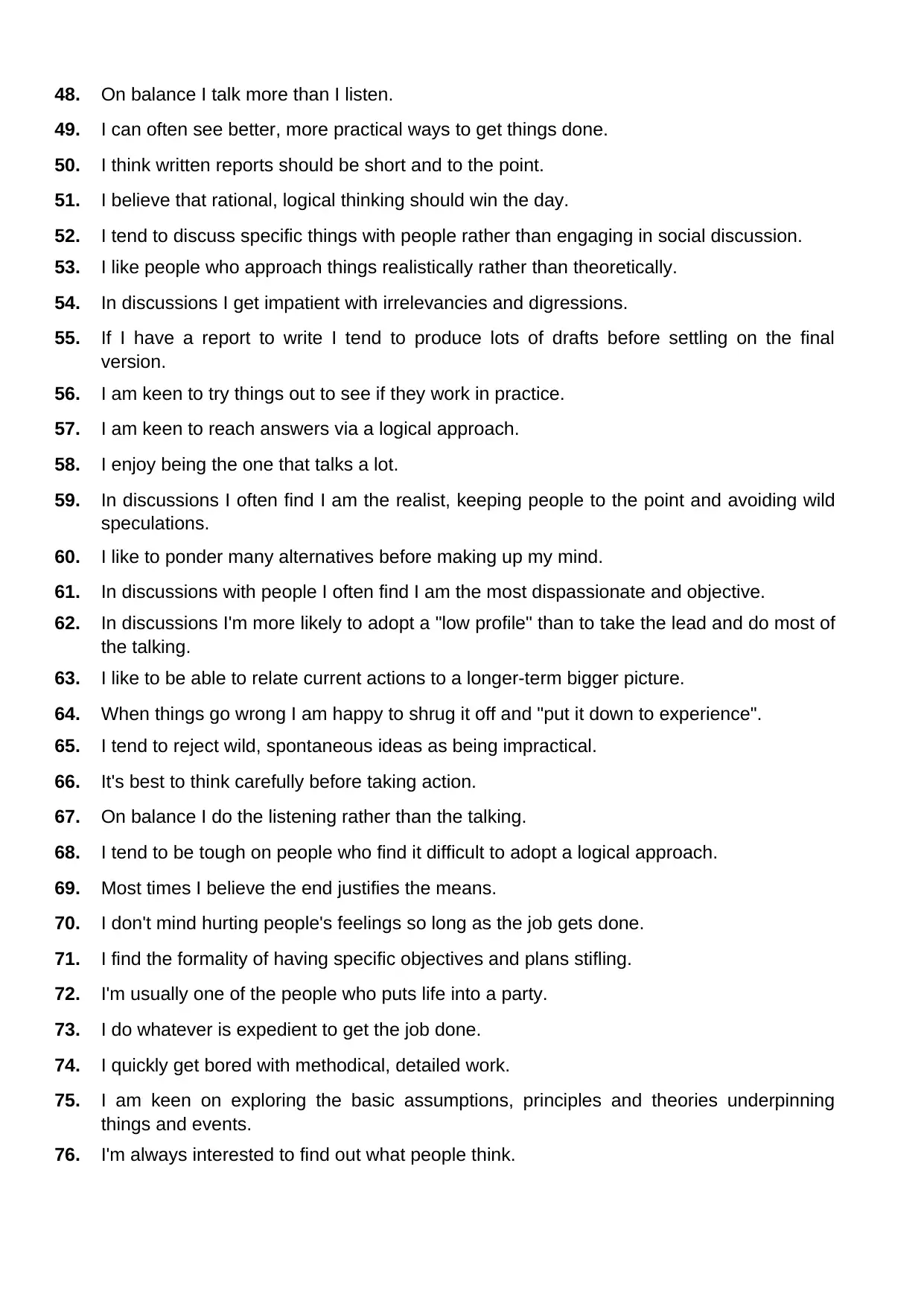
48. On balance I talk more than I listen.
49. I can often see better, more practical ways to get things done.
50. I think written reports should be short and to the point.
51. I believe that rational, logical thinking should win the day.
52. I tend to discuss specific things with people rather than engaging in social discussion.
53. I like people who approach things realistically rather than theoretically.
54. In discussions I get impatient with irrelevancies and digressions.
55. If I have a report to write I tend to produce lots of drafts before settling on the final
version.
56. I am keen to try things out to see if they work in practice.
57. I am keen to reach answers via a logical approach.
58. I enjoy being the one that talks a lot.
59. In discussions I often find I am the realist, keeping people to the point and avoiding wild
speculations.
60. I like to ponder many alternatives before making up my mind.
61. In discussions with people I often find I am the most dispassionate and objective.
62. In discussions I'm more likely to adopt a "low profile" than to take the lead and do most of
the talking.
63. I like to be able to relate current actions to a longer-term bigger picture.
64. When things go wrong I am happy to shrug it off and "put it down to experience".
65. I tend to reject wild, spontaneous ideas as being impractical.
66. It's best to think carefully before taking action.
67. On balance I do the listening rather than the talking.
68. I tend to be tough on people who find it difficult to adopt a logical approach.
69. Most times I believe the end justifies the means.
70. I don't mind hurting people's feelings so long as the job gets done.
71. I find the formality of having specific objectives and plans stifling.
72. I'm usually one of the people who puts life into a party.
73. I do whatever is expedient to get the job done.
74. I quickly get bored with methodical, detailed work.
75. I am keen on exploring the basic assumptions, principles and theories underpinning
things and events.
76. I'm always interested to find out what people think.
49. I can often see better, more practical ways to get things done.
50. I think written reports should be short and to the point.
51. I believe that rational, logical thinking should win the day.
52. I tend to discuss specific things with people rather than engaging in social discussion.
53. I like people who approach things realistically rather than theoretically.
54. In discussions I get impatient with irrelevancies and digressions.
55. If I have a report to write I tend to produce lots of drafts before settling on the final
version.
56. I am keen to try things out to see if they work in practice.
57. I am keen to reach answers via a logical approach.
58. I enjoy being the one that talks a lot.
59. In discussions I often find I am the realist, keeping people to the point and avoiding wild
speculations.
60. I like to ponder many alternatives before making up my mind.
61. In discussions with people I often find I am the most dispassionate and objective.
62. In discussions I'm more likely to adopt a "low profile" than to take the lead and do most of
the talking.
63. I like to be able to relate current actions to a longer-term bigger picture.
64. When things go wrong I am happy to shrug it off and "put it down to experience".
65. I tend to reject wild, spontaneous ideas as being impractical.
66. It's best to think carefully before taking action.
67. On balance I do the listening rather than the talking.
68. I tend to be tough on people who find it difficult to adopt a logical approach.
69. Most times I believe the end justifies the means.
70. I don't mind hurting people's feelings so long as the job gets done.
71. I find the formality of having specific objectives and plans stifling.
72. I'm usually one of the people who puts life into a party.
73. I do whatever is expedient to get the job done.
74. I quickly get bored with methodical, detailed work.
75. I am keen on exploring the basic assumptions, principles and theories underpinning
things and events.
76. I'm always interested to find out what people think.
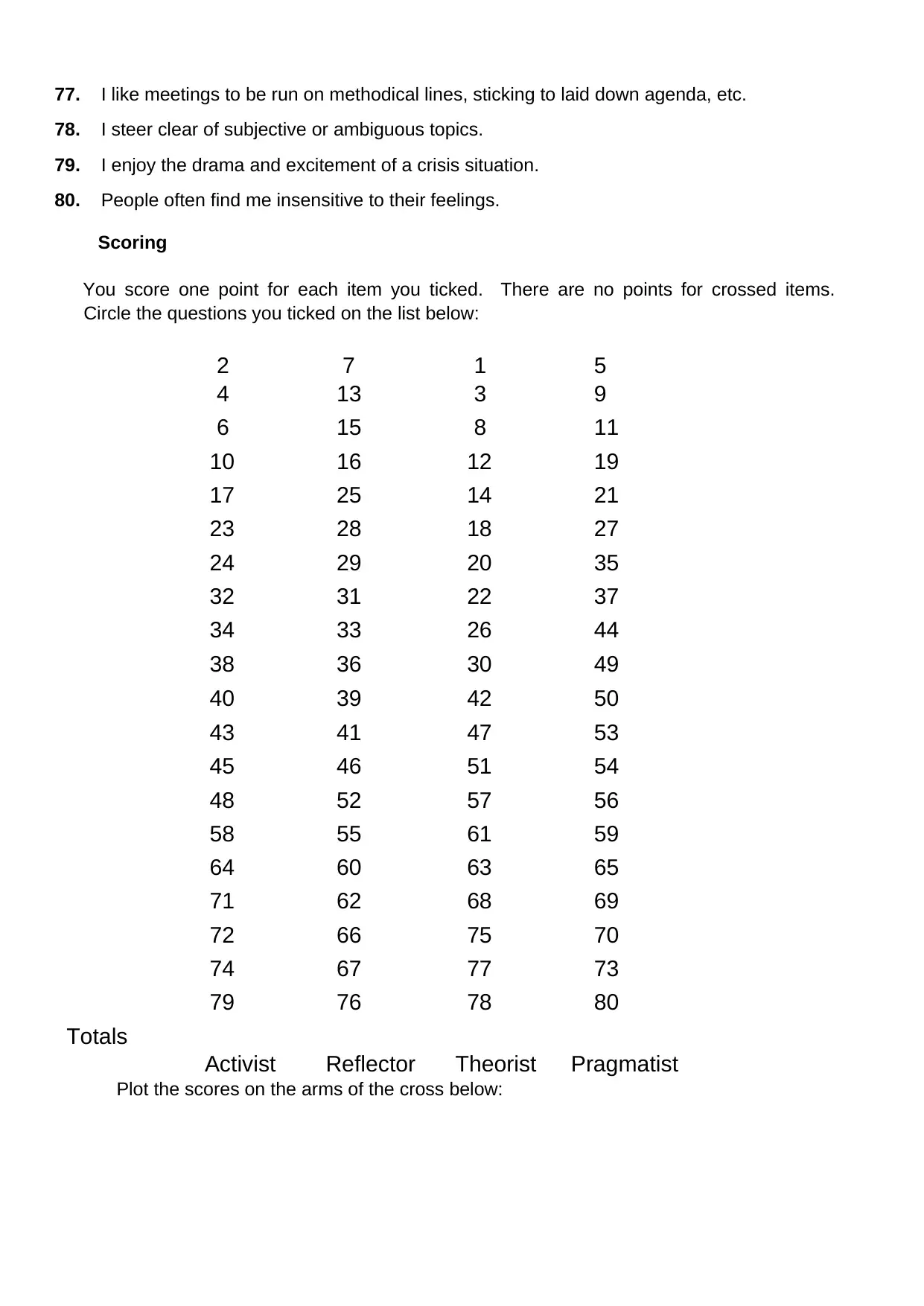
77. I like meetings to be run on methodical lines, sticking to laid down agenda, etc.
78. I steer clear of subjective or ambiguous topics.
79. I enjoy the drama and excitement of a crisis situation.
80. People often find me insensitive to their feelings.
Scoring
You score one point for each item you ticked. There are no points for crossed items.
Circle the questions you ticked on the list below:
2 7 1 5
4 13 3 9
6 15 8 11
10 16 12 19
17 25 14 21
23 28 18 27
24 29 20 35
32 31 22 37
34 33 26 44
38 36 30 49
40 39 42 50
43 41 47 53
45 46 51 54
48 52 57 56
58 55 61 59
64 60 63 65
71 62 68 69
72 66 75 70
74 67 77 73
79 76 78 80
Totals
Activist Reflector Theorist Pragmatist
Plot the scores on the arms of the cross below:
78. I steer clear of subjective or ambiguous topics.
79. I enjoy the drama and excitement of a crisis situation.
80. People often find me insensitive to their feelings.
Scoring
You score one point for each item you ticked. There are no points for crossed items.
Circle the questions you ticked on the list below:
2 7 1 5
4 13 3 9
6 15 8 11
10 16 12 19
17 25 14 21
23 28 18 27
24 29 20 35
32 31 22 37
34 33 26 44
38 36 30 49
40 39 42 50
43 41 47 53
45 46 51 54
48 52 57 56
58 55 61 59
64 60 63 65
71 62 68 69
72 66 75 70
74 67 77 73
79 76 78 80
Totals
Activist Reflector Theorist Pragmatist
Plot the scores on the arms of the cross below:
Paraphrase This Document
Need a fresh take? Get an instant paraphrase of this document with our AI Paraphraser
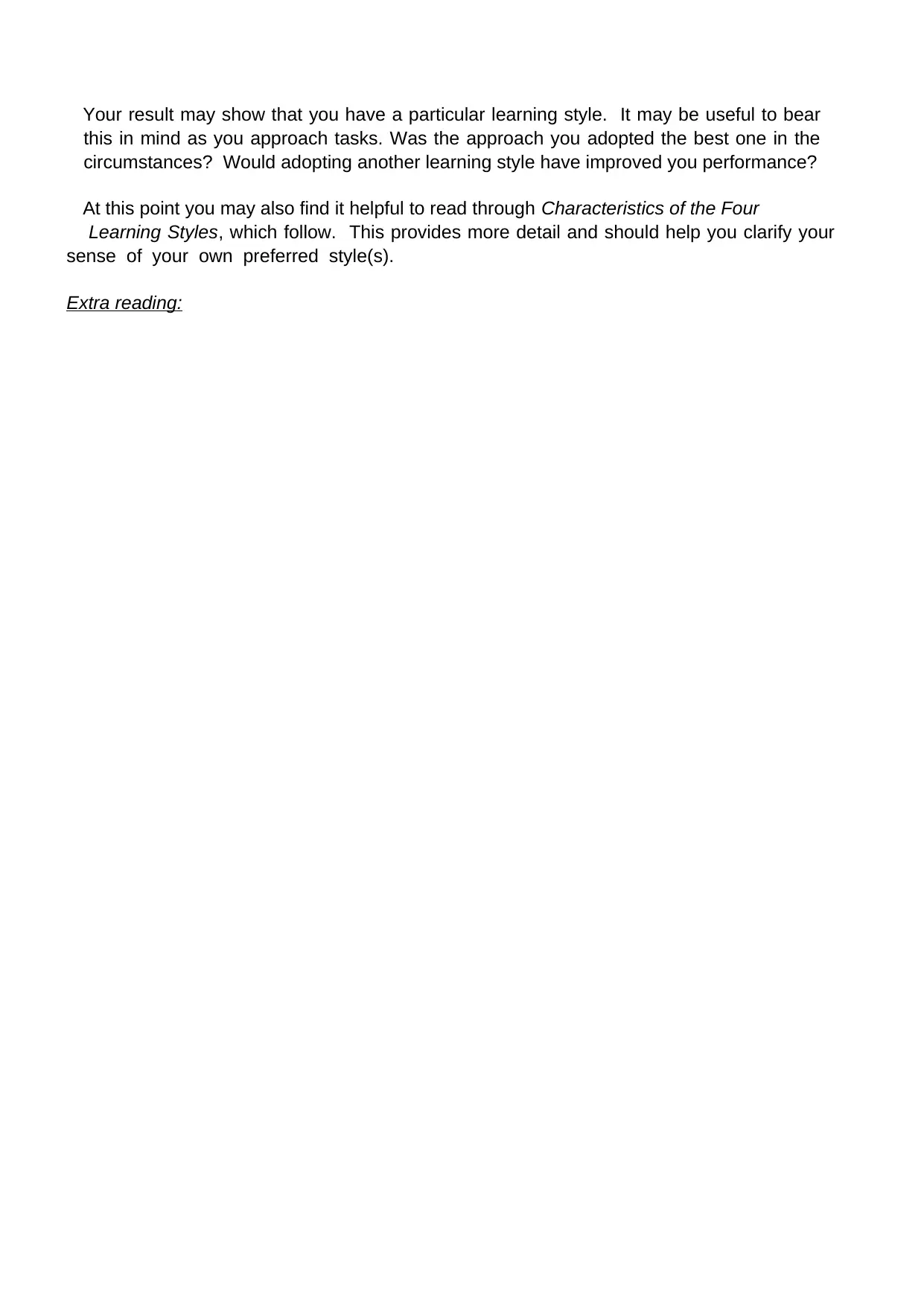
Your result may show that you have a particular learning style. It may be useful to bear
this in mind as you approach tasks. Was the approach you adopted the best one in the
circumstances? Would adopting another learning style have improved you performance?
At this point you may also find it helpful to read through Characteristics of the Four
Learning Styles, which follow. This provides more detail and should help you clarify your
sense of your own preferred style(s).
Extra reading:
this in mind as you approach tasks. Was the approach you adopted the best one in the
circumstances? Would adopting another learning style have improved you performance?
At this point you may also find it helpful to read through Characteristics of the Four
Learning Styles, which follow. This provides more detail and should help you clarify your
sense of your own preferred style(s).
Extra reading:
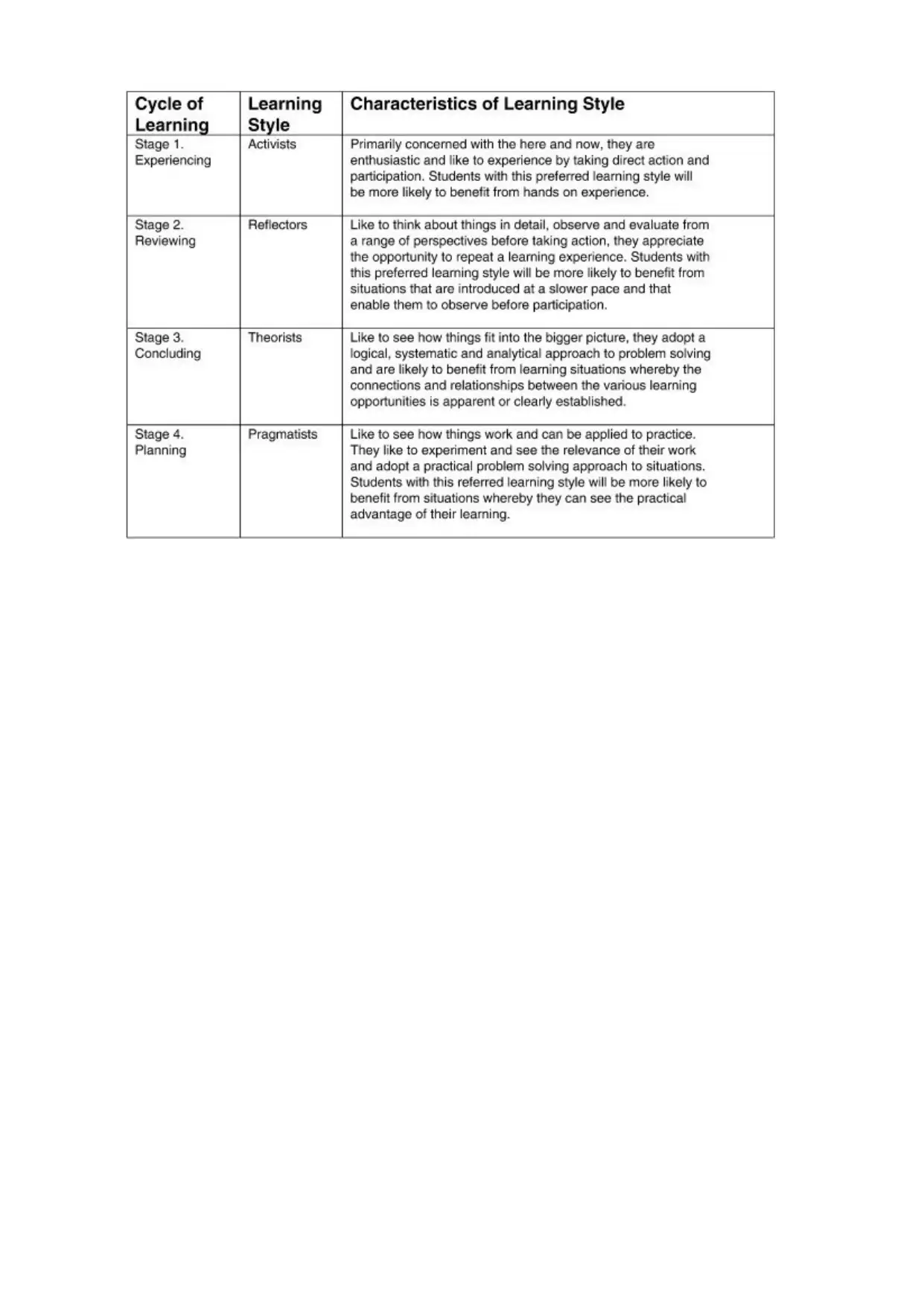
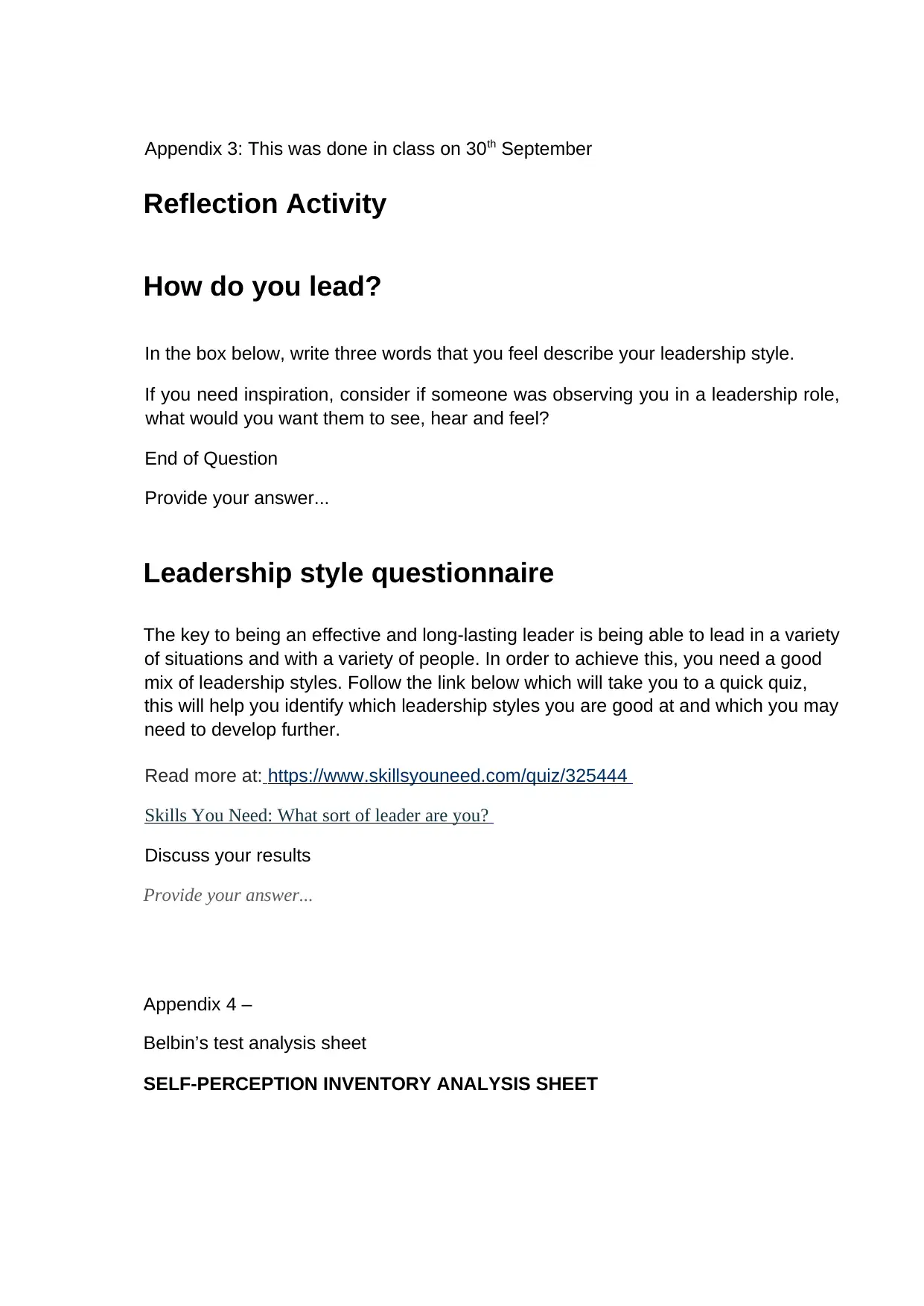
Appendix 3: This was done in class on 30th September
Reflection Activity
How do you lead?
In the box below, write three words that you feel describe your leadership style.
If you need inspiration, consider if someone was observing you in a leadership role,
what would you want them to see, hear and feel?
End of Question
Provide your answer...
Leadership style questionnaire
The key to being an effective and long-lasting leader is being able to lead in a variety
of situations and with a variety of people. In order to achieve this, you need a good
mix of leadership styles. Follow the link below which will take you to a quick quiz,
this will help you identify which leadership styles you are good at and which you may
need to develop further.
Read more at: https://www.skillsyouneed.com/quiz/325444
Skills You Need: What sort of leader are you?
Discuss your results
Provide your answer...
Appendix 4 –
Belbin’s test analysis sheet
SELF-PERCEPTION INVENTORY ANALYSIS SHEET
Reflection Activity
How do you lead?
In the box below, write three words that you feel describe your leadership style.
If you need inspiration, consider if someone was observing you in a leadership role,
what would you want them to see, hear and feel?
End of Question
Provide your answer...
Leadership style questionnaire
The key to being an effective and long-lasting leader is being able to lead in a variety
of situations and with a variety of people. In order to achieve this, you need a good
mix of leadership styles. Follow the link below which will take you to a quick quiz,
this will help you identify which leadership styles you are good at and which you may
need to develop further.
Read more at: https://www.skillsyouneed.com/quiz/325444
Skills You Need: What sort of leader are you?
Discuss your results
Provide your answer...
Appendix 4 –
Belbin’s test analysis sheet
SELF-PERCEPTION INVENTORY ANALYSIS SHEET
Secure Best Marks with AI Grader
Need help grading? Try our AI Grader for instant feedback on your assignments.

Transpose the scores taken from the points table above, entering them
section by section in the table below. Then add up the points in each column
to give a total team-role distribution score.
section by section in the table below. Then add up the points in each column
to give a total team-role distribution score.
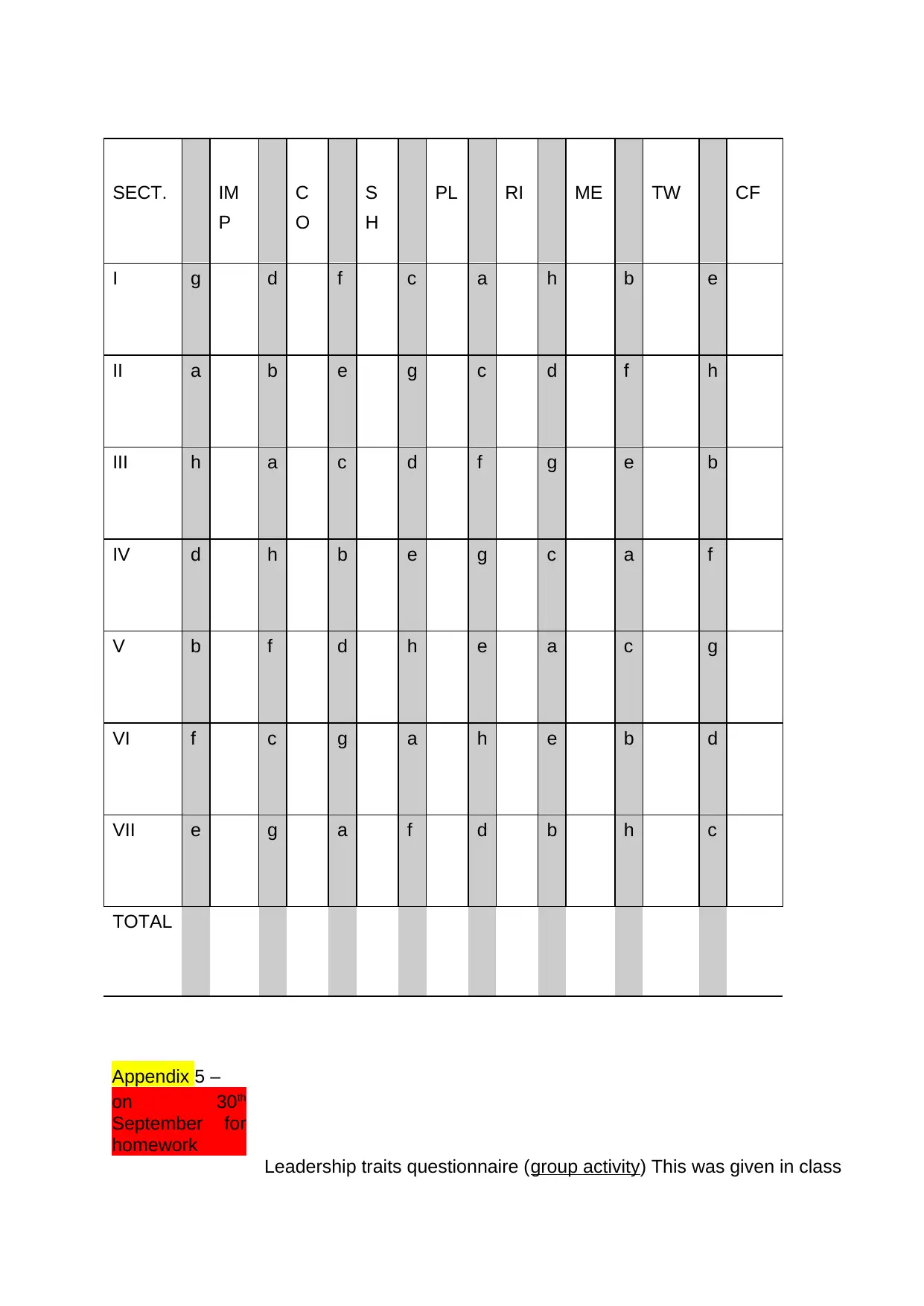
SECT. IM
P
C
O
S
H
PL RI ME TW CF
I g d f c a h b e
II a b e g c d f h
III h a c d f g e b
IV d h b e g c a f
V b f d h e a c g
VI f c g a h e b d
VII e g a f d b h c
TOTAL
Appendix 5 –
on 30th
September for
homework
Leadership traits questionnaire (group activity) This was given in class
P
C
O
S
H
PL RI ME TW CF
I g d f c a h b e
II a b e g c d f h
III h a c d f g e b
IV d h b e g c a f
V b f d h e a c g
VI f c g a h e b d
VII e g a f d b h c
TOTAL
Appendix 5 –
on 30th
September for
homework
Leadership traits questionnaire (group activity) This was given in class
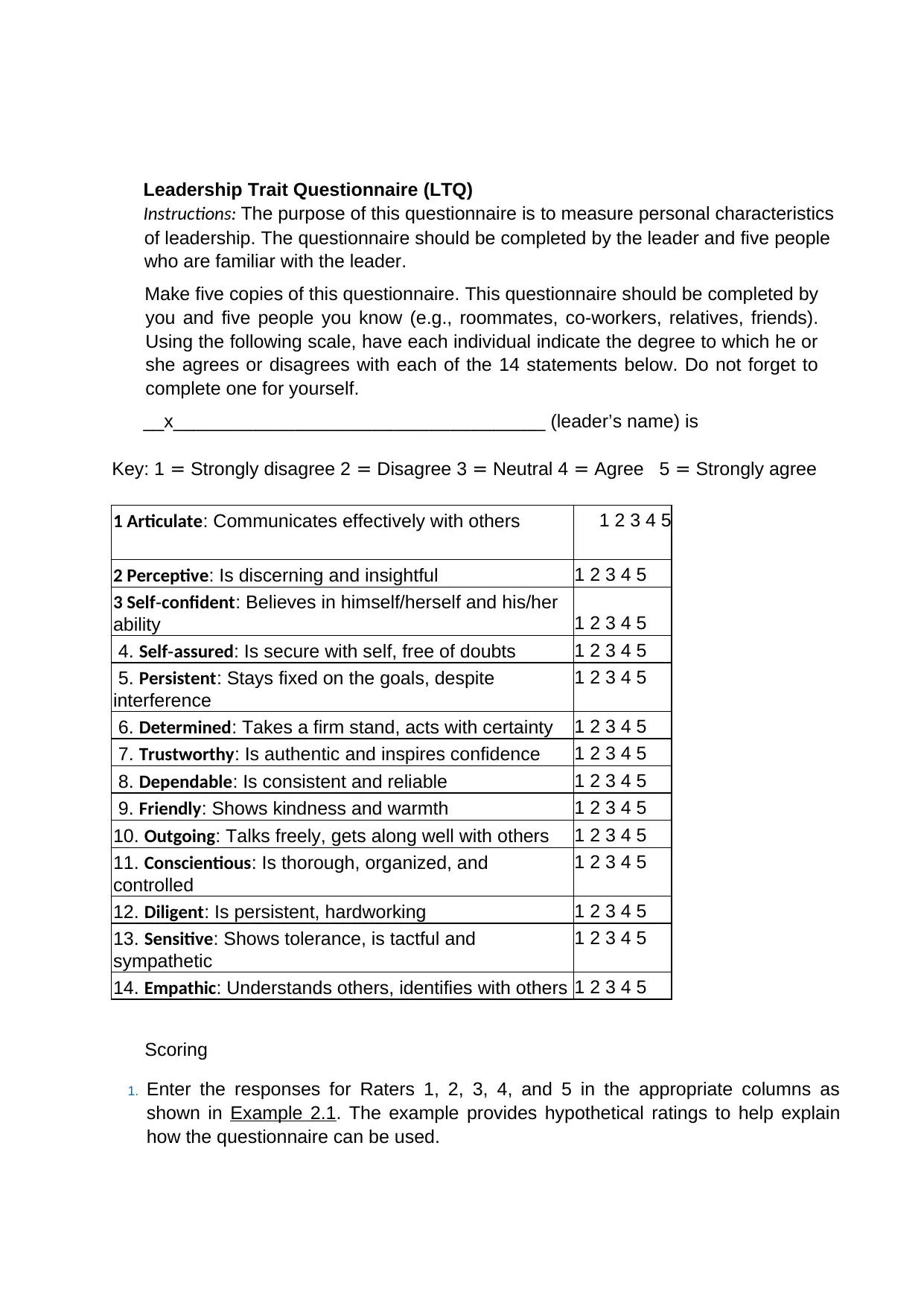
Leadership Trait Questionnaire (LTQ)
Instructions: The purpose of this questionnaire is to measure personal characteristics
of leadership. The questionnaire should be completed by the leader and five people
who are familiar with the leader.
Make five copies of this questionnaire. This questionnaire should be completed by
you and five people you know (e.g., roommates, co-workers, relatives, friends).
Using the following scale, have each individual indicate the degree to which he or
she agrees or disagrees with each of the 14 statements below. Do not forget to
complete one for yourself.
__x____________________________________ (leader’s name) is
Key: 1 = Strongly disagree 2 = Disagree 3 = Neutral 4 = Agree 5 = Strongly agree
1 Articulate: Communicates effectively with others 1 2 3 4 5
2 Perceptive: Is discerning and insightful 1 2 3 4 5
3 Self-confident: Believes in himself/herself and his/her
ability 1 2 3 4 5
4. Self-assured: Is secure with self, free of doubts 1 2 3 4 5
5. Persistent: Stays fixed on the goals, despite
interference
1 2 3 4 5
6. Determined: Takes a firm stand, acts with certainty 1 2 3 4 5
7. Trustworthy: Is authentic and inspires confidence 1 2 3 4 5
8. Dependable: Is consistent and reliable 1 2 3 4 5
9. Friendly: Shows kindness and warmth 1 2 3 4 5
10. Outgoing: Talks freely, gets along well with others 1 2 3 4 5
11. Conscientious: Is thorough, organized, and
controlled
1 2 3 4 5
12. Diligent: Is persistent, hardworking 1 2 3 4 5
13. Sensitive: Shows tolerance, is tactful and
sympathetic
1 2 3 4 5
14. Empathic: Understands others, identifies with others 1 2 3 4 5
Scoring
1. Enter the responses for Raters 1, 2, 3, 4, and 5 in the appropriate columns as
shown in Example 2.1. The example provides hypothetical ratings to help explain
how the questionnaire can be used.
Instructions: The purpose of this questionnaire is to measure personal characteristics
of leadership. The questionnaire should be completed by the leader and five people
who are familiar with the leader.
Make five copies of this questionnaire. This questionnaire should be completed by
you and five people you know (e.g., roommates, co-workers, relatives, friends).
Using the following scale, have each individual indicate the degree to which he or
she agrees or disagrees with each of the 14 statements below. Do not forget to
complete one for yourself.
__x____________________________________ (leader’s name) is
Key: 1 = Strongly disagree 2 = Disagree 3 = Neutral 4 = Agree 5 = Strongly agree
1 Articulate: Communicates effectively with others 1 2 3 4 5
2 Perceptive: Is discerning and insightful 1 2 3 4 5
3 Self-confident: Believes in himself/herself and his/her
ability 1 2 3 4 5
4. Self-assured: Is secure with self, free of doubts 1 2 3 4 5
5. Persistent: Stays fixed on the goals, despite
interference
1 2 3 4 5
6. Determined: Takes a firm stand, acts with certainty 1 2 3 4 5
7. Trustworthy: Is authentic and inspires confidence 1 2 3 4 5
8. Dependable: Is consistent and reliable 1 2 3 4 5
9. Friendly: Shows kindness and warmth 1 2 3 4 5
10. Outgoing: Talks freely, gets along well with others 1 2 3 4 5
11. Conscientious: Is thorough, organized, and
controlled
1 2 3 4 5
12. Diligent: Is persistent, hardworking 1 2 3 4 5
13. Sensitive: Shows tolerance, is tactful and
sympathetic
1 2 3 4 5
14. Empathic: Understands others, identifies with others 1 2 3 4 5
Scoring
1. Enter the responses for Raters 1, 2, 3, 4, and 5 in the appropriate columns as
shown in Example 2.1. The example provides hypothetical ratings to help explain
how the questionnaire can be used.
Paraphrase This Document
Need a fresh take? Get an instant paraphrase of this document with our AI Paraphraser
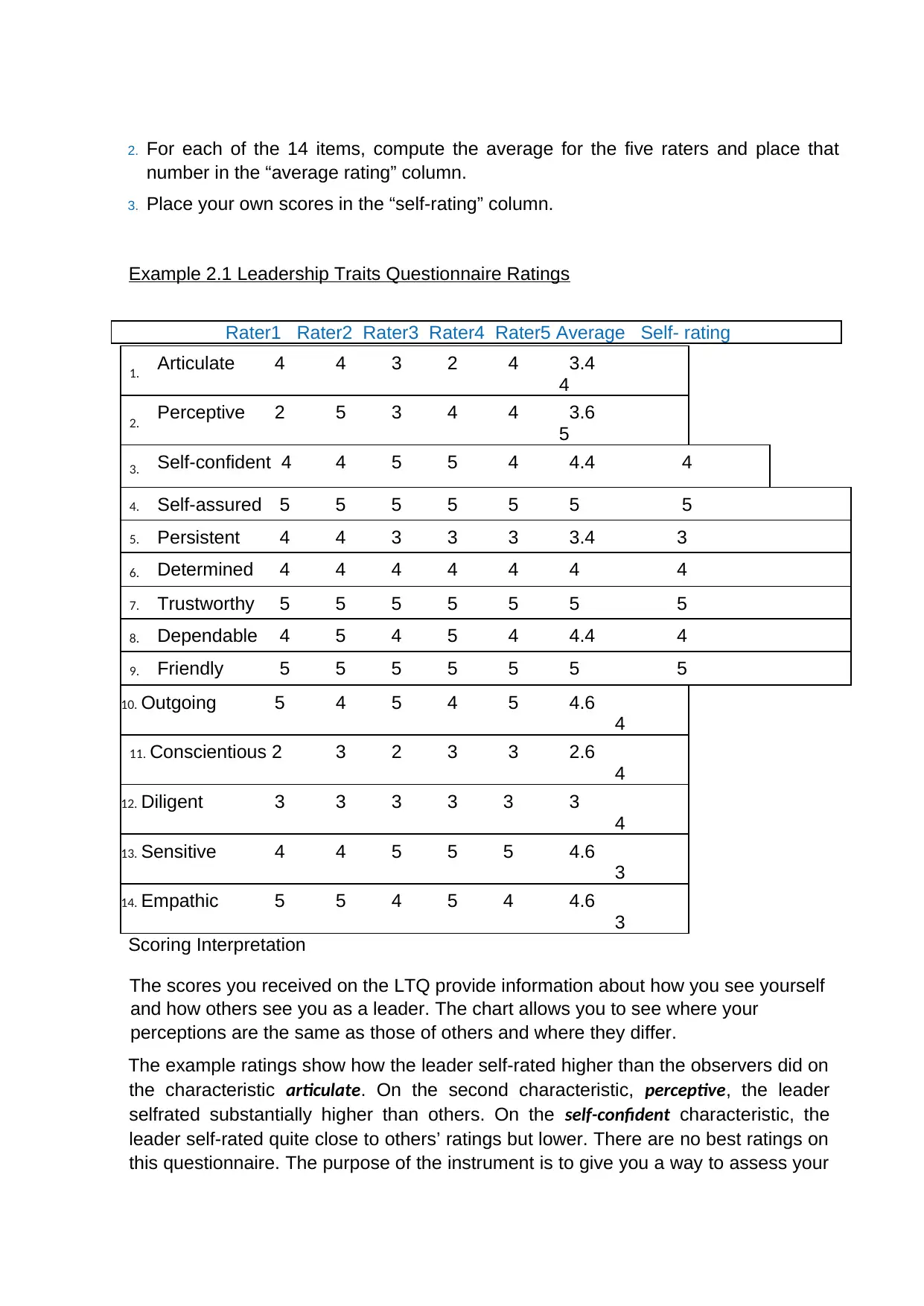
2. For each of the 14 items, compute the average for the five raters and place that
number in the “average rating” column.
3. Place your own scores in the “self-rating” column.
Example 2.1 Leadership Traits Questionnaire Ratings
Rater1 Rater2 Rater3 Rater4 Rater5 Average Self- rating
1. Articulate 4 4 3 2 4 3.4
4
2. Perceptive 2 5 3 4 4 3.6
5
3. Self-confident 4 4 5 5 4 4.4 4
4. Self-assured 5 5 5 5 5 5 5
5. Persistent 4 4 3 3 3 3.4 3
6. Determined 4 4 4 4 4 4 4
7. Trustworthy 5 5 5 5 5 5 5
8. Dependable 4 5 4 5 4 4.4 4
9. Friendly 5 5 5 5 5 5 5
10. Outgoing 5 4 5 4 5 4.6
4
11. Conscientious 2 3 2 3 3 2.6
4
12. Diligent 3 3 3 3 3 3
4
13. Sensitive 4 4 5 5 5 4.6
3
14. Empathic 5 5 4 5 4 4.6
3
Scoring Interpretation
The scores you received on the LTQ provide information about how you see yourself
and how others see you as a leader. The chart allows you to see where your
perceptions are the same as those of others and where they differ.
The example ratings show how the leader self-rated higher than the observers did on
the characteristic articulate. On the second characteristic, perceptive, the leader
selfrated substantially higher than others. On the self-confident characteristic, the
leader self-rated quite close to others’ ratings but lower. There are no best ratings on
this questionnaire. The purpose of the instrument is to give you a way to assess your
number in the “average rating” column.
3. Place your own scores in the “self-rating” column.
Example 2.1 Leadership Traits Questionnaire Ratings
Rater1 Rater2 Rater3 Rater4 Rater5 Average Self- rating
1. Articulate 4 4 3 2 4 3.4
4
2. Perceptive 2 5 3 4 4 3.6
5
3. Self-confident 4 4 5 5 4 4.4 4
4. Self-assured 5 5 5 5 5 5 5
5. Persistent 4 4 3 3 3 3.4 3
6. Determined 4 4 4 4 4 4 4
7. Trustworthy 5 5 5 5 5 5 5
8. Dependable 4 5 4 5 4 4.4 4
9. Friendly 5 5 5 5 5 5 5
10. Outgoing 5 4 5 4 5 4.6
4
11. Conscientious 2 3 2 3 3 2.6
4
12. Diligent 3 3 3 3 3 3
4
13. Sensitive 4 4 5 5 5 4.6
3
14. Empathic 5 5 4 5 4 4.6
3
Scoring Interpretation
The scores you received on the LTQ provide information about how you see yourself
and how others see you as a leader. The chart allows you to see where your
perceptions are the same as those of others and where they differ.
The example ratings show how the leader self-rated higher than the observers did on
the characteristic articulate. On the second characteristic, perceptive, the leader
selfrated substantially higher than others. On the self-confident characteristic, the
leader self-rated quite close to others’ ratings but lower. There are no best ratings on
this questionnaire. The purpose of the instrument is to give you a way to assess your
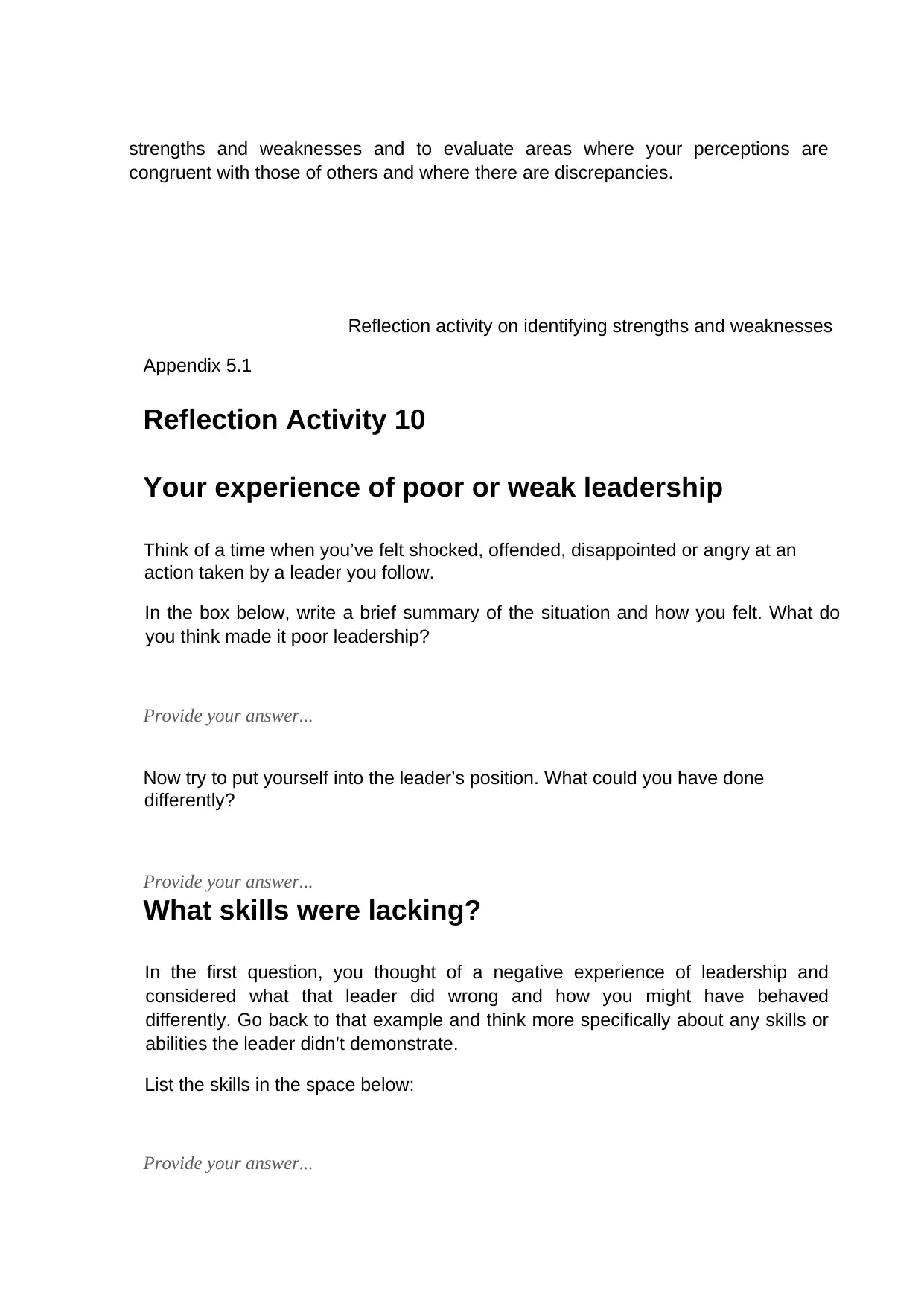
strengths and weaknesses and to evaluate areas where your perceptions are
congruent with those of others and where there are discrepancies.
Reflection activity on identifying strengths and weaknesses
Appendix 5.1
Reflection Activity 10
Your experience of poor or weak leadership
Think of a time when you’ve felt shocked, offended, disappointed or angry at an
action taken by a leader you follow.
In the box below, write a brief summary of the situation and how you felt. What do
you think made it poor leadership?
Provide your answer...
Now try to put yourself into the leader’s position. What could you have done
differently?
Provide your answer...
What skills were lacking?
In the first question, you thought of a negative experience of leadership and
considered what that leader did wrong and how you might have behaved
differently. Go back to that example and think more specifically about any skills or
abilities the leader didn’t demonstrate.
List the skills in the space below:
Provide your answer...
congruent with those of others and where there are discrepancies.
Reflection activity on identifying strengths and weaknesses
Appendix 5.1
Reflection Activity 10
Your experience of poor or weak leadership
Think of a time when you’ve felt shocked, offended, disappointed or angry at an
action taken by a leader you follow.
In the box below, write a brief summary of the situation and how you felt. What do
you think made it poor leadership?
Provide your answer...
Now try to put yourself into the leader’s position. What could you have done
differently?
Provide your answer...
What skills were lacking?
In the first question, you thought of a negative experience of leadership and
considered what that leader did wrong and how you might have behaved
differently. Go back to that example and think more specifically about any skills or
abilities the leader didn’t demonstrate.
List the skills in the space below:
Provide your answer...
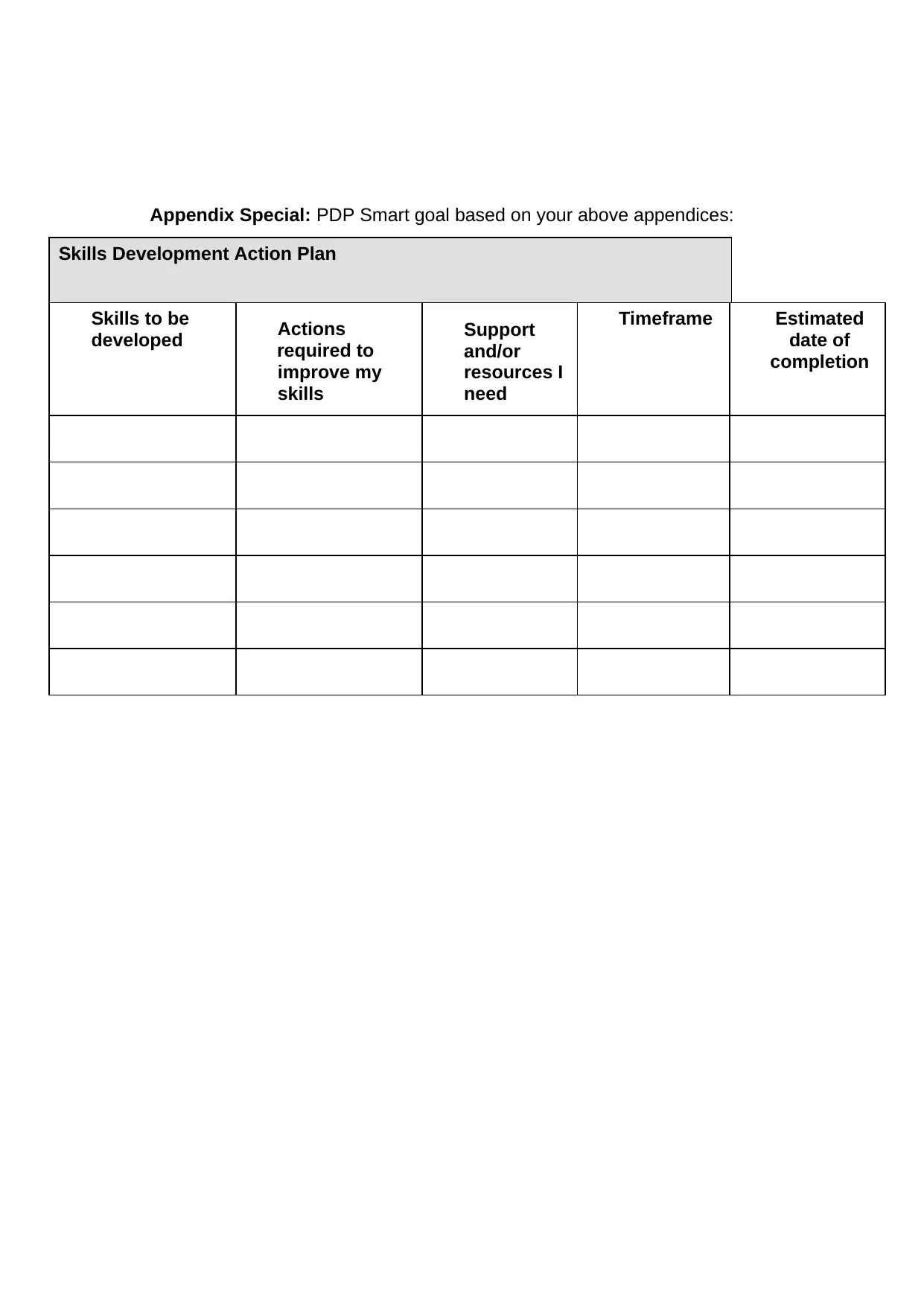
Appendix Special: PDP Smart goal based on your above appendices:
Skills Development Action Plan
Skills to be
developed Actions
required to
improve my
skills
Support
and/or
resources I
need
Timeframe Estimated
date of
completion
Skills Development Action Plan
Skills to be
developed Actions
required to
improve my
skills
Support
and/or
resources I
need
Timeframe Estimated
date of
completion
1 out of 22
Related Documents
Your All-in-One AI-Powered Toolkit for Academic Success.
+13062052269
info@desklib.com
Available 24*7 on WhatsApp / Email
![[object Object]](/_next/static/media/star-bottom.7253800d.svg)
Unlock your academic potential
© 2024 | Zucol Services PVT LTD | All rights reserved.





